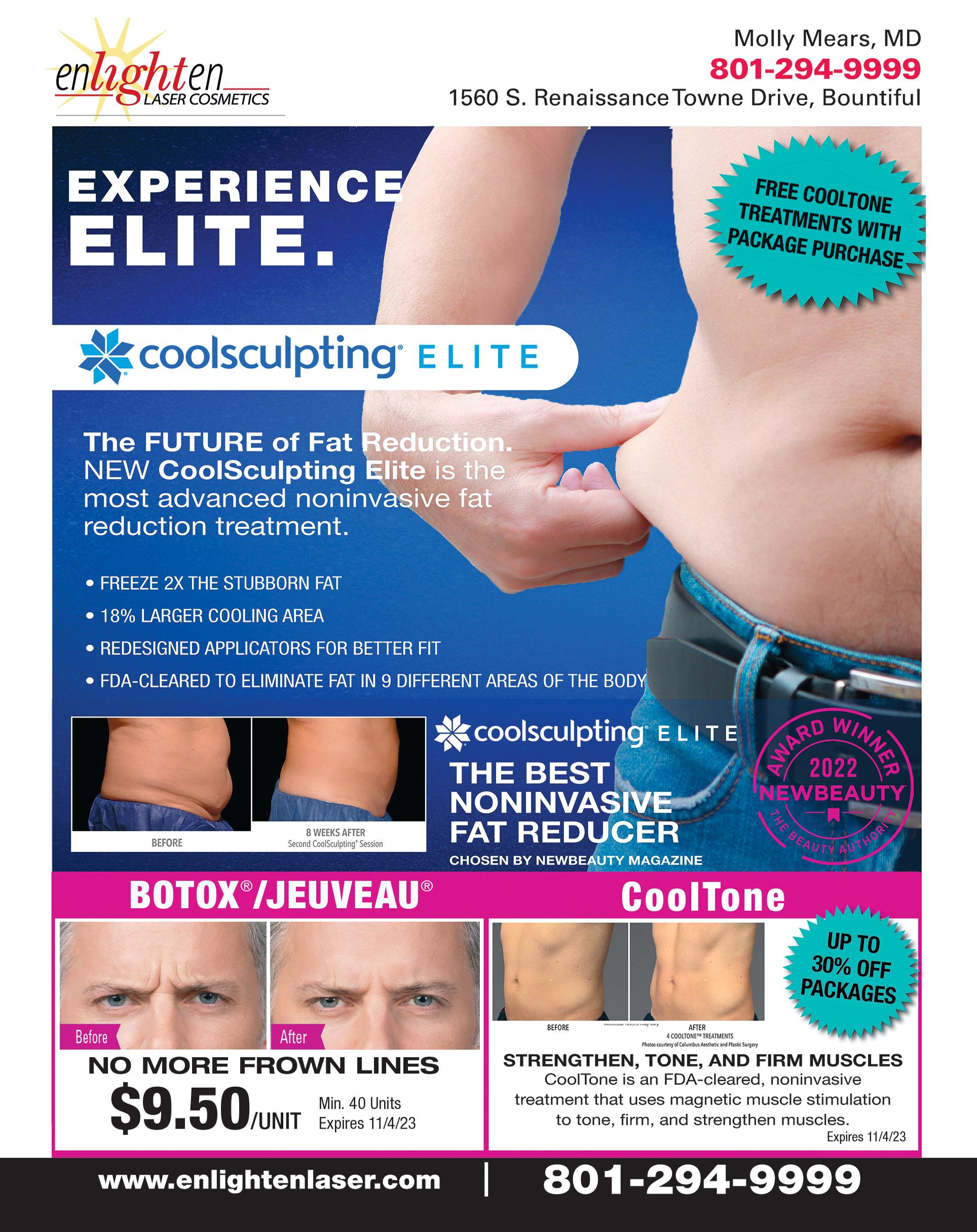AND: WILL THE UTAH PRIDE CENTER WEATHER THIS STORM?


AND: WILL THE UTAH PRIDE CENTER WEATHER THIS STORM?

publisher/editor Michael Aaron
designer Christian Allred
sales Michael Aaron, 801-997-9763 x1 sales@qsaltlake.com
Meda Thompson, 208-576-1444 meda@qsaltlake.com
Rivendell Media, 908-232-2021 ext 200 sales@rivendellmedia.com
national neWs editor Craig Ogan
contributors Joshua Adamson Pickett, Diane Anderson-Minshall, Chris Azzopardi, Paul Berge, Jeff Berry, Paul Campbell, Laurie BennettCook, Roger Cox, Stephen Dark, Jennifer Dobner, Jack Fertig, Greg Fox, Oriol Gutierrez Jr., Tony Hobday, Blake Howell, Ashley Hoyle, Joshua Jones, Christopher Katis, Alpha Mercury, Sam Kelly-Mills, Craig Ogan, Peter Reynolds, Mikey Rox, Terri Schlichenmeyer, Gregg Shapiro, Petunia Pap Smear, Steven Petrow, Ed Sikov, JoSelle Vanderhooft, Ben Williams, D’Anne Witkowski
distribution Roger Cox publisher
Q Media Group
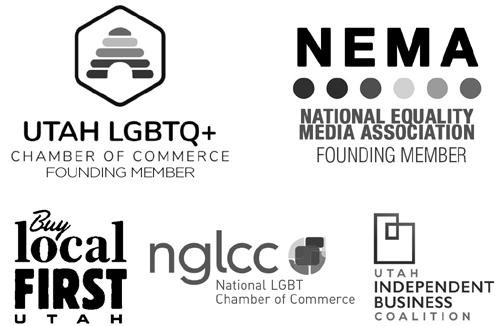
222 S Main St, Ste 500 (by appt. only) Salt Lake City, Utah 84101 tel: 801-997-9763
CONTACT EMAILS:
general: info@qsaltlake.com
editorial: editor@qsaltlake.com
arts: arts@qsaltlake.com
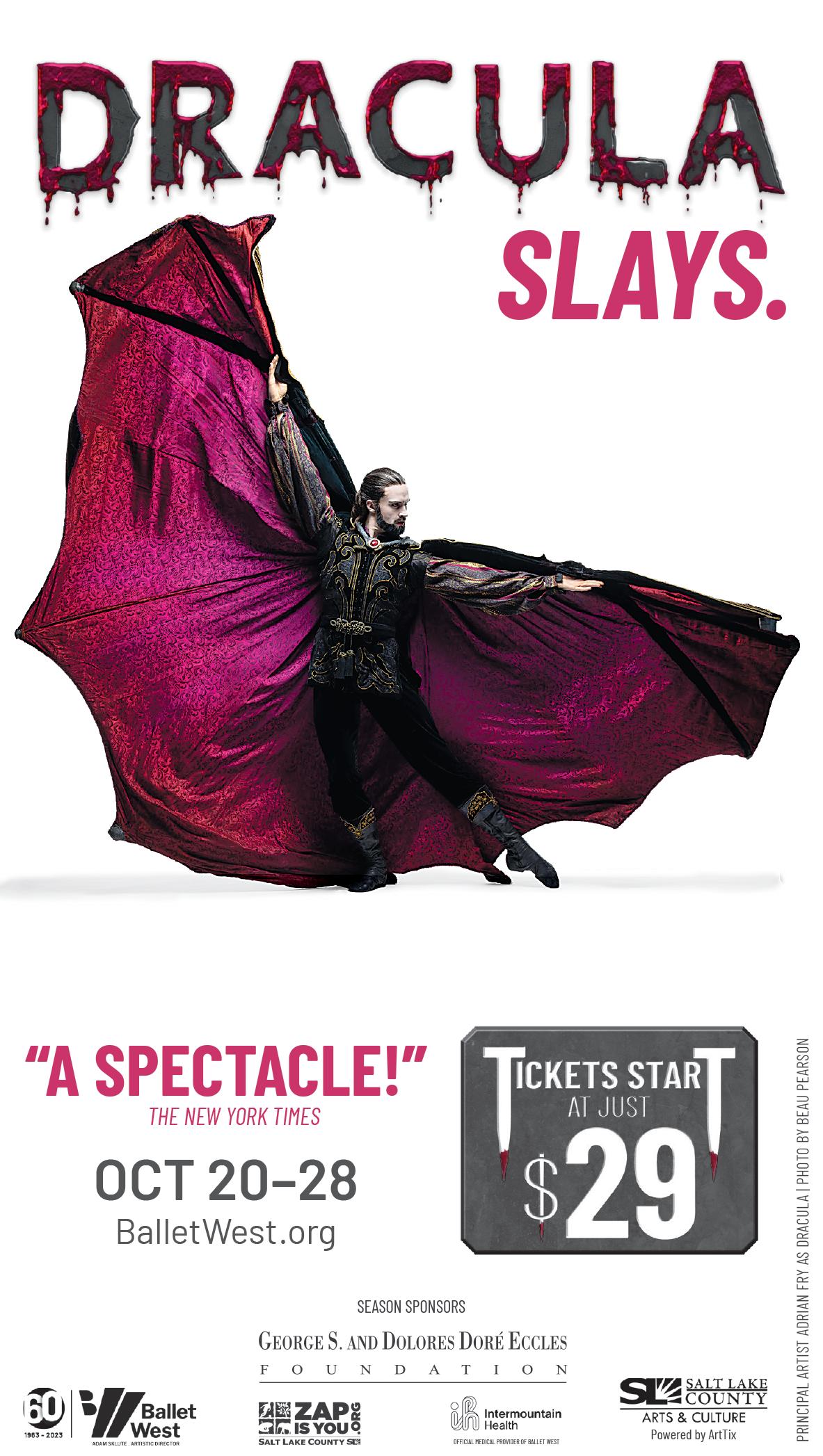
sales: sales@qsaltlake.com
Check us out online at: QSALTLAKE.COM
FACEBOOK.COM/QSALTLAKE
INSTAGRAM.COM/QSALTLAKE
TWITTER @QSALTLAKE
QSaltLake Magazine is a trademark of Salt Lick Publishing, LLC., Q Media Group
Copyright © 2023, Salt Lick Publishing, LLC. All rights reserved. No material may be reprinted or reproduced without written permission from the publisher. 8–18,000 copies are distributed free of charge at over 300 locations across the state. Free copies are limited to one per person. For additional copies, call 801-997-9763. It is a crime to dispose of current issues or otherwise interfere with the distribution of this magazine. Printed locally in the USA on recycled paper. Please recycle this copy when done.
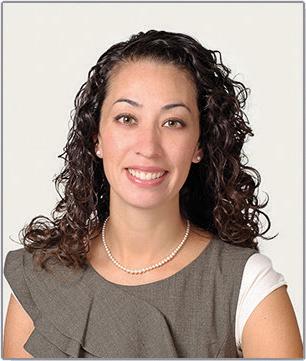


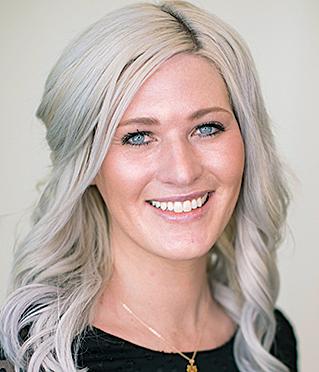


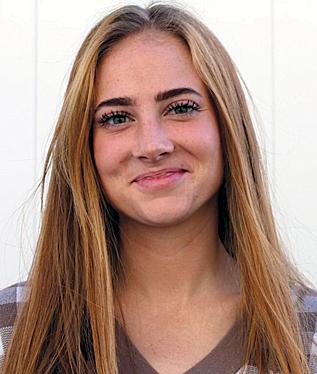
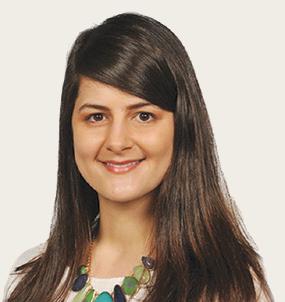


CALIFORNIA The Chino Valley Unified School District was sued for its policy of notifying parents when students seek to identify as a gender different than their birth certificate in school. The state attorney general claims the policy violates rights to privacy, equal protection of the laws, and freedom from discrimination under various California laws and the state constitution. A temporary restraining order was granted for a limited time. A second school district, Murrieta Valley Unified School District, has adopted the same policy recently. The district is not part of the AG’s suit yet, but the state school superintendent requested the district rescind the policy.
TEXAS An injunction halting a state law to ban pharmaceutical and surgical therapy for minors with gender dysphoria was denied. Texas became one of 21 states banning such therapy.
GEORGIA A federal judge allowed a ban on gender-related hormonal or surgical procedures for minors to resume. This overturns a previous ruling granting a preliminary injunction on the legislation. Court action is anticipated on bans on gender-related therapies, which have passed in
North Carolina, Idaho, Montana, Utah, Arizona, North Dakota, South Dakota, Nebraska, Oklahoma, Kentucky, Iowa, Alabama, Arkansas, Mississippi, Tennessee, Alabama, West Virginia, Indiana, Georgia, Louisiana, and Florida.
Hong Kong’s activists have lost another court case to establish marriage equality. Hong Kong’s highest court did not rule for marriage equality, but it has ordered the city to establish some form of legal recognition for same-sex couples. The court gave the city government two years to grant rights to same-sex couples for property ownership and inheritance, hospital visitation, and other rights similar to non-equality married couples The court declared, “The absence of legal recognition of [a samesex couple’s] relationship is apt to disrupt and demean their private lives together in ways that constitute arbitrary interference.” China decriminalized homosexual activity but has not authorized marriage equality, and the country’s culture remains averse to homosexual rights.
One of the first and most significant gay and lesbian rights organizations, the Gay and Lesbian Students Education Network, has new national leadership. Actor and activist Wilson Cruz, a longtime member of the GLSEN board of directors, is now chair. Cruz was one of the first “regular characters” on network TV, playing a gay teen in “My So-Called Life.” Another activist and long-serving board member, Imara Jones, is now vice chair.
Recently appointed Executive VP Melanie Willingham-Jaggers hailed the new leadership, “I can think of no better leadership team for this moment,” she says, citing new challenges facing GLSEN from opponents of the transgender rights movement in schools, especially high schools.
Country singer Ty Herndon marries, again Grammy-nominated country singer-songwriter Ty Herndon recently married his fiancé of six months, Alex Schwartz. Herndon was previously married. The ceremony, in “country chic” décor, was held on a farm in Chapmansboro, Tennessee, and attended by more than 300 guests, including actors Kristin Chenoweth and Sally Struthers. Herndon started in the business in the 1980s as a member of the Tennessee River Boys. He has recorded 10 studio albums and had three #1 singles on Billboard Country Charts.
The first active NFL player to publicly identify as gay, Carl Nassib, is retiring from professional football. He is leaving the Tampa Bay Buccaneers after beginning his NFL career in 2016 with the Cleveland Browns. He also played for what is now the Las Vegas Raiders, then moved to Tampa Bay in 2022. He will continue working with the NFL philanthropies and promoting diversity and inclusion.
Nina Simone may sing her civil rights anthem with a different spin to mark the election of Fabian Nelson, a gay Black man, who is expected to become Mis-
sissippi’s first publicly gay state legislator. Nelson won a runoff in a Democratic Party Primary for a district in the state capital of Jackson, Mississippi. No Republican is running in the district.
General Roberto Vannacci
One fabulous-looking Italian Army general got busted for a book he wrote saying some negative things about gay people. General Roberto Vannacci was head of Italy’s elite paratrooper unit and carried out missions in Iraq and Afghanistan until Italy’s defense minister disciplined him for the book, “The World Upside Down.” Vannacci wrote that homosexual men are not normal and claims there is an “international gay lobby” trying to “brainwash the world.” He also appears to question whether Black people can be Italian. The Army said it had not reviewed the text before it was published. Vannacci now works in the Army’s geographical map division.
Former Kentucky county clerk Kim Davis denied a marriage license to a gay couple after the 2015 Obergefell v. Hodges U.S. Supreme Court decision made marriage equality legal, even in rural Kentucky. The couple sued and was awarded $100,000 by a federal jury this year. The wheels of justice move slowly and roll on as Davis’ attorneys, the Liberty Council, vowed to appeal the award. Davis was sent to jail for contempt of court in 2015, and a deputy county clerk issued licenses to one and all, equally, in her stead.
One of the most successful HIV prevention programs, the President’s Emergency Plan for AIDS Relief, was authorized in 2005 by President George W. Bush. The program is credited with providing care to 25 million people experiencing HIV worldwide through the distribution of anti-HIV drugs and educational programs. PEPFAR has become controversial to anti-abortion members of Congress who want to cut the program. Bush, a pro-life president, wrote an Op-Ed in the Washington Post, telling lawmakers the program that was created under his leadership is “sufficiently pro-life to continue supporting.” He wrote, “We are on the verge of ending the HIV/AIDS epidemic. To abandon our commitment now would forfeit two decades of unimaginable progress and raise further questions about the worth of America’s word.”
After being chased out in 2019, Chick-fil-A is opening a franchise store in England in 2025. The restaurant has been criticized in the U.S. for its founder and former CEO, Dan Cathy’s support of the Salvation Army and Fellowship Christan Athletes, with their anti-gay and anti-marriage equality policies. Regardless of fast service and good-tasting food, activists have called for boycotts of the restaurant since 2012. In 2019, the restaurant chain changed its charitable policies, ending donations to perceived anti-gay and anti-marriage equality groups. The company said it would give exclusively to organizations working on education, homelessness, and hunger.

theOnpress day of our September issue, QSaltLake Magazine learned that over a third of the staff of the Utah Pride Center were laid off. We reached out to Center leaders for a statement that would give the community hope that the Center wasn’t about to fall to its knees.
The statement came well after we were supposed to get our last pages to the press, but we were able to get a half-page story in just before the final signature of the publication had to be plated.
To those not in the publishing business, that means we snuck it under the wire. Barely.
Reading the statement, however, was disappointing, at least. It was read by this writer as devastating.
It was obvious that the statement was never looked over by anyone with a public relations, legal, or nonprofit leadership background. The statement left little hope for the community that Pride would survive, much less thrive. As a Pride sponsor, it left me wondering if we were supporting a lost cause; if we would be dragged down with the sinking ship. I can imagine other sponsors wondered the same.

It was obvious that leaders of the
Center were not prepared beforehand to look outward to the community in its time of crisis. Leadership failed.
“We at the Pride Center acknowledge the disappointment and outrage of the community regarding the instability of our organization. We know how important the Center is to you, and we solemnly apologize for letting you down,” the statement began. Wow.
They went on to talk about their sadness of having to let people go because of the “massive financial turmoil that the Center is currently facing.”
They called the problems of their financial situation “monumental.”
Those are the words you read in the September issue of QSaltLake Magazine. Those are the words other news outlets, having read our story, quoted us as reporting. Those are the words that radio personalities used to declare, “The Utah Pride Center is closing.”
The space I am using to write this news analysis piece was supposed to be full of both background and a few updates from Center leaders. Any and all information I was able to collect
about what went on, what the current financial status truly is, and how the Center got to this point were from people who would not go on the record.
And it is a lot of hearsay because no one currently at the helm would take the time to talk to us.
After reaching out dozens of times with no response, I finally got a note that I should expect something Sept. 20 — a day after our press day for October. I was able to get the press to move our time slot 24 hours.
But then, radio silence happened all week, and not until my angst made it to my Facebook page did I receive a reply from co-CEO Tanya Hawkins.
“Right now, I do not have an update for you.”
I was also able to find the cellphone number of Utah Pride Center Board Chair Jess Couser. I received a text statement that said, basically, we gotta give the leaders time … wholeheartedly committed … our mission, etc. A non-statement statement.
“In short, we are working every day, and we will provide more information as soon as we have it,” Couser summarized. “We acknowledge that this journey will necessitate transparency and difficult decisions.”
One of my questions to Couser was when we would see the Center’s 2020–21 and 2021–22 IRS filings, as the 2022–23 financial year ends Sept. 30.
“As soon as those are filed, those will be available.”
Many questions were raised in social media posts by those who were let go in August. Questions like why they were not given even a week’s severance while, at the same time, they were actively searching for a new executive director with a salary range of $75,000 to $150,000.
Like, why wasn’t the Board actively working to help raise funds to keep the Center alive if they knew of the “monumental” financial straits the organization was in?
Three of the ten board members are no longer part of Utah Pride Center since the layoffs, according to website updates made that day. Apparently exiting included former board chair Gloria Casteneda. Mike Iwasaki is no longer listed as Vice Chair. Couser was secretary of the board until being labeled as chair right around the time of the layoffs.

Another question — how poorly did the 2023 Utah Pride Festival do, financially? Did the extra spending on security (five-fold from previous years) and “bigger names” that graced the stages of the Festival go through the board approval processes put in place
by previous Center board leaders?

And then, there are the questions raised by community members as the Center’s social media was barraged by naysayers.
The biggest: has the Utah Pride Center lost its focus on the community?
So, here I am — head of a magazine that has been an ardent supporter of the Utah Pride Center, which has gladly given over a half million dollars’ worth of sponsored advertising over the years — sounding like so many in our community who are so quick to pounce on the Center as it smells blood.



This, in and of itself, is part of the problem the Center has had over the years to maintain its footing. What sponsors want to be tied to an organization that has such vitriol thrown at it? I can think of seven former sponsors who left because of the angst directed at the Center — not of those who are against our community, but of the community itself.
So, yes, you will read in these words my frustration that the Center’s leaders didn’t feel it important enough to reach out to our community through our pages to give us a glimmer of hope as we wait for its leaders te re-emerge after sequestering themselves.
A mentor I reached out to for help on how to address this article summarized it well.
“By being silent during such a grave
crisis, [Utah Pride Center leaders] are leaving their fate in the hands of public opinion,” they said. “If they think they can just ride it out, they will fail.”
The scale and volume of the Center leaders’ response will determine the organization’s survival, especially in protecting one of the most important assets they still have and can leverage: the goodwill of a community that believes in the mission of the Center.
“QSaltLake is the right outlet for the Center to acknowledge the emotional landscape,” he continued.
“Even something as simple as ‘we see you, we hear you, and we are here to make the changes with you.’“
Current leaders, while nice people, were not up to the task for the challenge of leadership in this trying time. They’ve lacked transparency through the past years on their financial status. The board does not reflect the community itself.
Through all of this, I sit here as someone who believes in the concept and the necessity of an LGBTQ community center. I wait, holding my breath, with the hope that Salt Lake City can be big enough, strong enough, and courageous enough to maintain our Center, through thick, and through thin. Q
When selling real estate, you don’t want any part-�me agent working homes as a side hustle. You want a professional who’s versed in 1031 Exchanges, when to sell to avoid capital gains, taxes, and who works well with your lawyer, CPA and re�rement plan. With 38 years experience and broker/owner of my own firm, I’ve been in the top 10% of sales agents for decades. And I was the first ‘out’ LGBTQ agent on the Salt Lake Board of Realtors. Your money is important and I don’t charge high fees to provide you outstanding service.
De Lay, Urban Utah Homes and Estates 801.201.8824
As Utah’s U.S. Sen. Mitt Romney announces his retirement from the U.S. Senate, it will also likely be his final hurrah for politics in general.
As he leaves, we look at his journey on LGBT issues. From the early stages of his political career to his role as a U.S. Senator from Utah in 2019, Romney’s positions on LGBT rights, gay marriage, and civil unions have undergone a series of transformations. Here’s a comprehensive look at his changing views over the years:
1994: A STRONG ADVOCATE FOR GAY RIGHTS Romney began his political career with a promise to be a staunch advocate for gay rights. During his 1994 Senate campaign, he sent a letter to the Log Cabin Republicans, declaring his commitment to making equality for gays and lesbians a mainstream concern. Lobbyist Arlene Isaacson said Romney’s campaign distributed pink flyers at the gay Pride parade that asserted that he would be a better and a stronger advocate than Kennedy.
At the time, the Boy Scouts of America was embroiled in controversy over its policy of excluding gay scouts from participating. During a televised debate against Kennedy, Romney, who was serving on the organization’s National Executive Board, said, “I feel that all people should be able to participate in the Boy Scouts regardless of their sexual orientation.”
2002: SUPPORT FOR DOMESTIC PARTNERSHIP BENEFITS During his 2002 Massachusetts gubernatori-
al campaign, Romney voiced support for domestic partnership benefits, emphasizing that all citizens deserve equal rights, regardless of their sexual orientation. He believed domestic partnership status should encompass health benefits and survivorship rights.
2003: OPPOSITION TO SAME-SEX MARRIAGE In response to a Massachusetts Supreme Court ruling requiring the legalization of same-sex marriage, Romney supported a state constitutional amendment that would have legalized civil unions while banning same-sex marriage. He aimed to limit the scope of the court’s ruling without triggering a constitutional crisis.
2006: SUPPORT FOR FEDERAL MARRIAGE AMENDMENT Romney’s opposition to same-sex marriage became evident during his 2006 presidential campaign when he endorsed the Federal Marriage Amendment, which aimed to constitutionally define marriage as a union between one man and one woman.
2012: MIXED RECORD AND PRESIDENTIAL BID During his 2012 presidential campaign, Romney’s stance on LGBT issues remained complex. He opposed same-sex marriage and civil unions but supported domestic partnership benefits, hospital visitation rights, and non-discrimination laws at the state level.
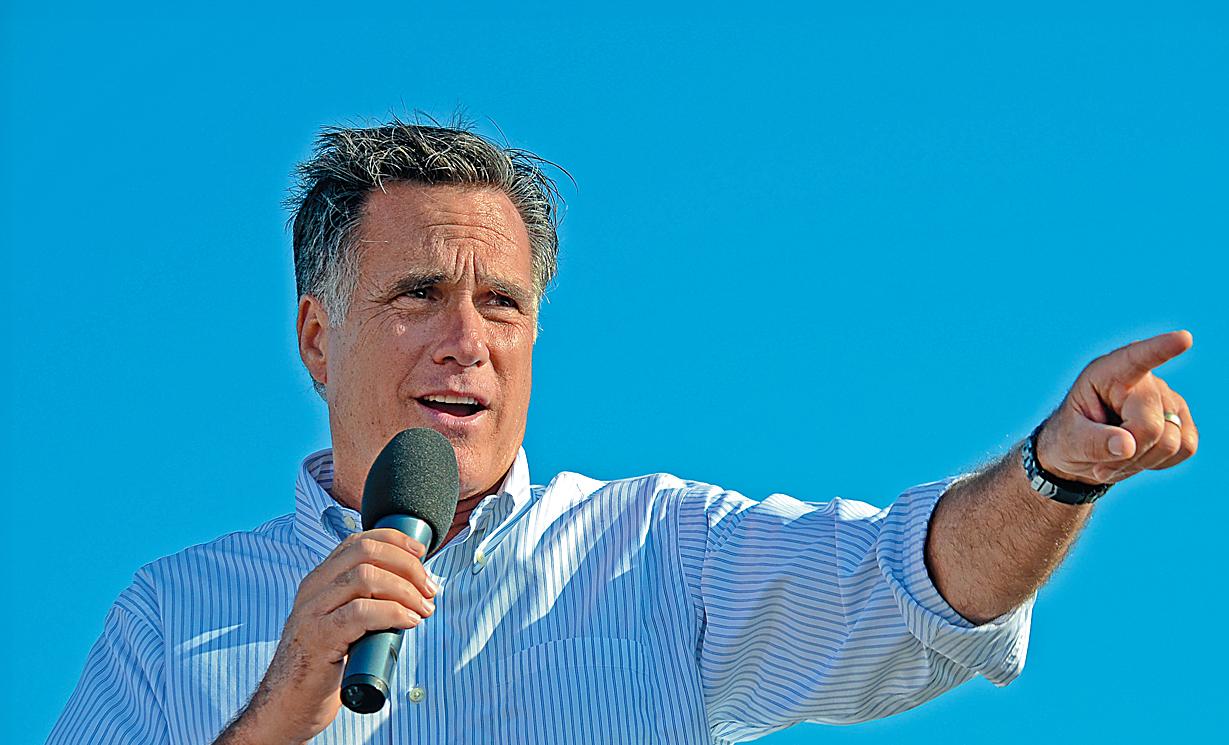
2019: THE FAIRNESS FOR ALL ACT As a U.S. Senator from Utah in 2019, Romney expressed appreciation for the proposed Fairness for All Act, which
sought to prohibit discrimination against LGBT individuals while including exemptions for religious groups and small businesses with religious foundations.
2021: EQUALITY ACT Romney said he opposed the Equality Act, legislation to expand the prohibition on anti-LGBTQ discrimination under federal law, throwing a massive wrench into the plans of the bill’s supporters to guide it into law.
“Sen. Romney believes that strong religious liberty protections are essential to any legislation on this issue, and since those provisions are absent from this particular bill, he is not able to support it,” said Arielle Mueller, a Romney spokesperson.
2021: TRANSGENDER GIRLS IN SCHOOL SPORTS Romney noted photos of his eight granddaughters among his grandsons on the wall of his office, saying, “They shouldn’t be competing with people who are physiologically in an entirely different category, and I think boys should be competing with boys and girls should be competing with (girls) on the athletic field.”
2022: SUPPORT FOR THE RESPECT FOR MARRIAGE ACT In a notable move, Romney voted in 2022 to advance the Respect for Marriage Act, which aimed to protect existing same-sex and interracial marriages outside of Supreme Court precedents like Obergefell v. Hodges. Despite his continued personal opposition to same-sex marriage, Romney cited fairness to already-married samesex couples as a reason for his vote.
Romney was one of only 12 Republicans to vote in favor of the Act.
“While I believe in traditional marriage, Obergefell is and has been the law of the land upon which LGBTQ individuals have relied. This legislation provides certainty to many LGBTQ Americans, and it signals that Congress — and I — esteem and love all of our fellow Americans equally,” Romney released in a statement. “This legislation provides important protections for religious liberty—measures which are particularly important to protect the religious freedoms of our faith-based institutions. I appreciate the efforts of Senators Baldwin, Collins, and others to address this concern, and heartily support their legislation.” Q


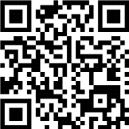


Two LGBTQ candidates came up short in the primary for the St. George, Utah, city council race. With 14 candidates lining up for three seats on the council, the three incumbents made it through to the general election in November, with one barely making it in 6th place.
Katheryne Knight, who is bisexual, and Austin Hodges, who is gay, campaigned for the seats. Both said they were responding, in part, to the culture wars happening in the area.
“The people of St. George are tired of the division,” Hodges said. “They are tired of the infighting and the bickering. I feel like they are ready for a candidate who won’t stand for mudslinging or aggression.”
Knight agrees, saying there are more important issues to spend valuable council time debating.
St. George has made national headlines several times over the issue of family-friendly drag shows in public spaces. The council fired its city manager in 2022 after an uproar by heavily conservative community members over his refusal to cancel a drag show event during the filming of HBO’s “We’re Here.” Since then, community members have targeted the local farmer’s market because it is run by a business owner who allows drag events in their building. The city council also voted to stop a drag show at a municipal park. The city was forced to allow the show by a U.S. district judge, who ruled the city violated the performers’ constitutional right to freedom of speech and expression.
Two of the non-incumbent council candidates are running on highly conservative platforms, which include resistance to the new state flag, Second Amendment rights, and returning the name “Dixie” to Utah Tech University. Both are also targeting drag shows under terms such as “protecting children.”
“I believe the city council has a crucial role to play in safeguarding our children from adult content and sexualization, and I am committed to taking action to address this pressing concern within the boundaries of our legal framework,” Brad Bennett wrote on his campaign website. “I firmly believe that we must not allow any content or events that are age-inappropriate for children to be hosted in venues where they are likely to be present. This includes adult-oriented material, as well as content
that can be sensitive, confusing, or provocative for their young minds.”
“It is unacceptable for any adult content, whether direct or implied, to be displayed in areas where children are present or in public spaces such as parks. Creating safe and appropriate environments for everyone, especially children, to enjoy without exposure to inappropriate or mature content is essential,” candidate Paula Smith wrote on her site. “I will support any necessary action to ensure that does not occur.” Q
Brigham Young University recently added an explicit ban on “same-sex romantic behavior” to its Honor Code, a move some students argue goes beyond the stance of the Mormon Church.
In 2020, BYU removed the prohibition on “homosexual behavior” from its Honor Code, a decision that brought joy to LGBTQ+ students. However, the Church Educational System, which governs all BYU campuses, clarified that this did not indicate acceptance of “same-sex romantic behavior.” Last month, the school officially reinstated the ban.
The BYU Honor Code instructs students to lead a “chaste and virtuous life, including abstaining from sexual relations outside marriage between a man and a woman.” The updated language now includes that “living a chaste and virtuous life also includes abstaining from same-sex romantic behavior.”
BYU is affiliated with the Mormon Church, which opposes same-sex relationships, refrains from performing same-sex marriages, and encourages abstinence from same-gender sexual activity. Some church leaders have also criticized LGBTQ+ activism as being influenced by Satan.
Some BYU students claim that certain LDS congregations are more lenient when it comes to same-sex dating, whereas the university enforces stricter regulations on dating relationships.
Gracee Purcell, president of the RaYnbow Collective, a group supporting queer students and alumni at BYU that held its annual off-campus Back-to-School Pride near the BYU Provo campus on Sept. 16, said, “Depending on where you are, who your religious leaders are, you can actually date people of the same sex with very little church repercussions. At BYU, that usually gray line within the church is a hard line. Anything that they deem homosexual behavior, or samesex romantic behavior, is not allowed.”
The definition of “romantic behavior” includes dating, holding hands, or kissing. Violations will be addressed on a caseby-case basis, with the aim of guiding students to uphold their gospel covenants and university commitments, as outlined in BYU’s frequently asked questions.
“The lack of representation and the increase in religious and societal pressures won’t stop queer students from coming. But it will hurt them,” Purcell said. Q
In observance of Latinx Heritage Month, Under the Umbrella Bookstore announced a special event featuring author David Bowles, in collaboration with Salt Lake Community College, Unidxs, Plumas Colectiva, Artes de Mexico, the Human Rights Campaign, and the Community Writing Center. This event commemorates the release of Bowles’ latest book, The Prince and the Coyote, and will feature a conversation with Cindy Fierros, Professor of Psychology and Ethnic Studies at Salt Lake Community College, focusing on the profound themes of ancestry, identity, and connection that run through Bowles’ literary career.
This event is open to the public and will offer complimentary tamales and hot chocolate. The first 20
attendees will have the opportunity to receive a signed copy of Bowles’ latest book.
In the spirit of Latinx Heritage Month, following the discussion, participants will have the choice of attending two educational breakout sessions. Plumas Colectiva will lead a workshop exploring poetry and themes rooted in mythology, tradition, and identity. Simultaneously, Dr. Bernice Olivas from SLCC will facilitate a prose workshop delving into similar themes. This event is offered free of charge to the public. Spanish co-facilitation will be available to ensure inclusivity. Attendees are encouraged to secure their spot on Eventbrite. Q
The event will take place Saturday, October 7, from 1 to 3 p.m. at the Salt Lake Community College West Valley Center, 3460 S 5600 W, West Valley City
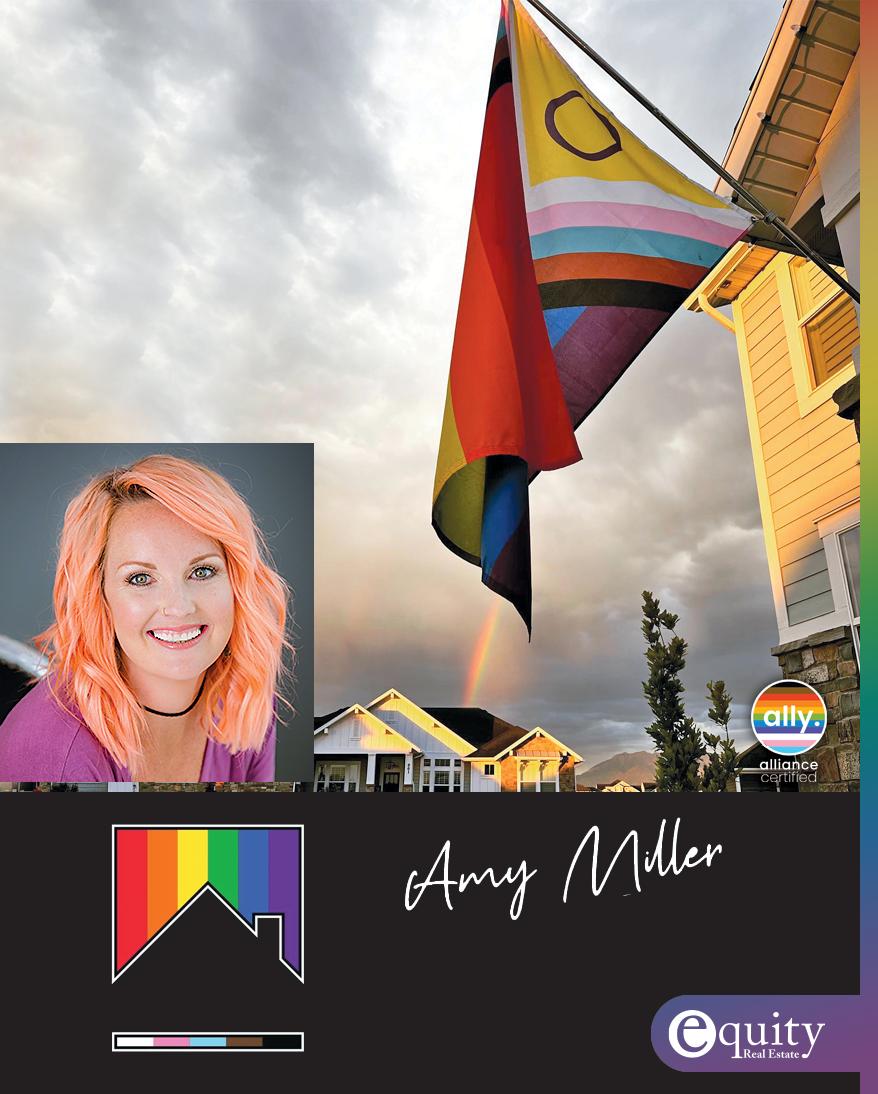 BY THE COMMUNITY, FOR THE COMMUNITY PUBLISHED BY QSALTLAKE MAGAZINE
SALES@QSALTLAKE COM
BY THE COMMUNITY, FOR THE COMMUNITY PUBLISHED BY QSALTLAKE MAGAZINE
SALES@QSALTLAKE COM


““Lauren Boebert is a disgrace to this country! Forget the politics. She’s in a t*tty dress. She’s with some dude. Looks like she’s obviously vaping, but also looks like she might be grabbing his penis. She is a disgrace!”
—Howard Stern
“We hold Congresswoman Boebert to a far lower standard than every other elected Republican and Democrat in Colorado. Otherwise we would be here near nightly chronicling the cruel, false, and bigoted things that Boebert says for attention and fundraising.”

— Kyle Clark, 9News Denver

“I figure if I take up vaping and grabbing the hog during a live musical, they’ll make me a folk hero.”
— Sen. John Fetterman.
“When Elon forces us to all register and pay I’m outta here faster than Lauren Boebert’s latest boyfriend.”
— Liam Nissan
Goodmorning! Or whatever time of the day you’re reading this. I happen to be writing this in the morning as my son, who is in high school, gets ready for the day. I remember prior to being a parent, I dreaded a future that included getting a kid off to school in the morning. I imagined it would be nothing but tension and stress and fights about putting on shoes and taking showers all while the clock counted down how many more minutes we had before being late. And there have definitely been mornings like that. But it’s not as bad as I feared it would be. Most of the time.
This particular morning, I am thinking of an email I sent to my son’s teacher and principal responding to a message about a Patriot Week event I received from the school. They are having a “panel discussion and civic dialogue” that my son’s class will be attending. I looked up the panelists, and they are all Republican, some of them very rightwing, such as a Michigan Supreme Court judge who has voted against LGBTQ+ rights and abortion issues.
But what concerned me most about this event was the involvement of the Patriot Week Foundation, which is described in the message from the school simply as a 501(c)(3) nonpartisan foundation. But this group is hardly some kind of innocuous entity. As I looked through their web page, I found articles with titles such as “Equity and the Race to the Bottom,” in which the author rails against “‘woke’ activists” and the “far-left excesses” of diversity, equity, and inclusion (DEI). There are also posts criticizing the teaching or acknowledgment of systemic racism.
Needless to say, I’m not very happy that my son’s school has invited this group to speak to its students, especially since the school district itself has a DEI program
that it purports to stand behind. My wife and I chose this district for our son because it is one of the best in Michigan and one of the few that includes sexual orientation and gender identity in its non-discrimination language.
When I told my son about my concerns about this event, he asked if I would be upset if the panel were all Democrats. And I said no. Which he called hypocritical. But I don’t think it is. Because if the group were all Democrats, they wouldn’t be against teaching about racism, which is real, or lamenting DEI initiatives, which are necessary to combat the systemic oppression of historically marginalized groups.
I tried to explain that there was no middle ground on some subjects between Republicans and Democrats because Republicans have become so extreme. Both my son and my wife pushed back on that. But I contend that you can’t find a compromise with a party that, for example, believes that transgender people shouldn’t exist and that anyone who is transgender or who supports transgender people is a danger to society, especially children. You can’t find a middle ground on climate change when the Republican Party’s position is that it’s a hoax, even as we all see extreme weather events wreaking havoc around the globe with our own eyes.
It’s not that I don’t want my son to hear about a conservative perspective. If it were just the Michigan Supreme Court judge coming to talk to students, I would not be upset. Granted, I would ensure my son knew where this judge stands on issues important to our family. But it is the inclusion of this Patriot Foundation group that concerns me, especially since the event was framed as something nonpartisan. This group clearly has a political agenda and an interpretation of this country’s founding
principles that is decidedly right-wing. All of this has got me thinking about the “parental rights” movement in this country. The many people who claim that school libraries carrying books that have any LGBTQ+ characters or themes violate their parental rights. That teaching about slavery or acknowledging past and present racism in this country violates their parental rights. That making kids wear masks during a pandemic, a decidedly scary and unsure time for everyone, violates their parental rights. These groups claim that public schools are indoctrinating students, turning them into transgender Marxists.
What about MY parental rights? These parental rights groups, like Moms for Liberty, have a very narrow definition of who parents are and what constitutes a legitimate concern. The fact is, parents already have a lot of rights when it comes to their kids’ education, including putting them into private schools or homeschooling if they find public schools objectionable. Parents are free to contact teachers and administrators with questions and concerns — just like I myself did about the Patriot Week event. There is not some insidious left-wing agenda afoot in our public schools. There is, however, a movement of Christian Nationalists who believe that this country belongs to them — and only them. They are a minority, to be sure, but they are very loud.
Parents who believe in teaching actual history, including being forthright about this nation’s history of racism, and who believe that LGBTQ+ students deserve to be protected and treated with acceptance at school have to be louder. There are more of us than there are of them. You have the right and a duty as a parent to speak up. Q
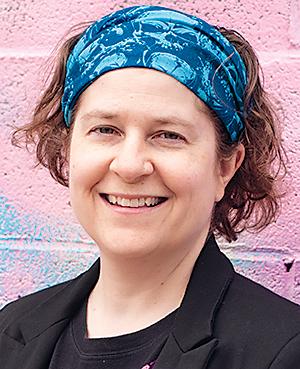 D’Anne Witkowski is a writer living with her wife and son. She has been writing about LGBTQ+ politics for nearly two decades. Follow her on Twitter @MamaDWitkowski
D’Anne Witkowski is a writer living with her wife and son. She has been writing about LGBTQ+ politics for nearly two decades. Follow her on Twitter @MamaDWitkowski
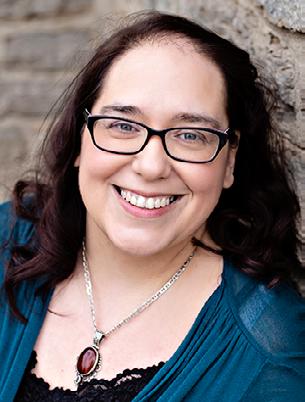
(“from the city!” no less). But the taunting often turned physical, and as far as I know, Bobby got far away as soon as he could. Lots of us did, and it wasn’t the economy, as much as many conservatives like to claim.
in a small town in rural Southern Ohio, and like so many LGBTQ+ people, I often feel I escaped from something I can’t quite define but can instantly recognize when I meet people with similar backgrounds. Because while I am from a small town, I’m not sure I was ever of “that same small town,” to quote the OG John Mellencamp small-town song.
Jason Aldean didn’t actually grow up in a small town, though he sang defiantly about leaving one that sucked in his 2018 lament “Rearview Town.” The MAGA darling hit screaming up the charts, “Try That in a Small Town,” written by someone else, doesn’t speak to his personal experience, either, but he’s got the story right, according to the Very Loud People of the Internet. And maybe his screed does get it right, for certain people in certain small towns. But as someone born and raised just outside a town of 850 people, a place where my progressive-minded parents were constantly getting ahead of the things I’d hear in the back of the bus every day, I’m here to tell you he doesn’t get it right for those of us who didn’t align with the “you ain’t from around here” crowd.
My small-town hometown is quaint, quiet and very friendly, as long as you’re not making waves. When I was growing up, you could fly under the radar as long as you kept your mouth shut when good ole boy behavior happened, like the n-word being used liberally behind closed doors or date rape being incredibly common. And maybe that sentiment and those behaviors aren’t exclusive to small towns, but once you’re branded as a slut or a (gasp!) queer person in a small town, your story is written and the consequences are immediate and forever. There’s an irony in how big the megaphone is, the smaller the town.
But I was a good, quiet girl and, for the most part, I went unnoticed, which was fine by me. I’d love to think that if I knew then what I know now, I’d have never kept my mouth shut when a friend told me her boyfriend, a kid in our Spanish II class, had held her down and raped her
in his car after a football game. I’d have delivered some kind of cinematic monologue on race relations and embracing LGBTQ+ people right in the center of the cafeteria (to wild applause, no doubt).
But I did nothing. Essentially, all of us who knew better in that small town did exactly nothing.
So it’s maybe not a surprise that the people dishing out the abuse and the racism and the queerphobia continue to feel emboldened and that their behaviors have continued devolving and festering into something that feels almost like a parody. And maybe it’s not shocking that these people feel so shocked, themselves, that the wider world out there isn’t buying what they’re selling. It’s shocking to discover, perhaps, that even though all the people around you seem completely fine with your 1950s viewpoints, that much of the rest of the world has woken up to the fact that every person deserves agency, even the ones denigrated for so long and so deeply that it’s become part of the actual culture in some small towns.
What I do know for sure is that my fellow classmate Bobby likely wouldn’t identify with some of these small-town people out here on TikTok, the ones sobbing that the Aldean song proves “someone gets us.” Bobby was sweet, way more stylish than most of us (probably more than most of our county), and he had an instantly recognizable affectation that put him squarely in the crosshairs of our high school bullies. It was nothing to hear him openly called a faggot, including in front of smirking teachers (many of whom grew up there, too). And being gay — even closeted but assumed — was about the worst thing you could be in our small town in the late ‘80s and early ‘90s. The kids I found out later who were also queer had stayed safely in the closet.
Bobby may have fared better than the one Black kid I recalled joining our school district for less than a year before his family essentially fled in the night. And probably a bit better than the family that had crosses burned in their lawn in the next town over for harboring a teenage daughter who, rumor had it, had dated a Black kid
Bad things happen everywhere, but it would be missing a compelling part of the narrative to pretend like what happened to, as one example among many, Matthew Shepard, didn’t happen in rural Wyoming. When he “tried that” (“that” meaning “literally existing as a gay man”) in a townie bar in Cheyenne, they showed him, all right. It’s similar to what happened to Brandon Teena, Billy Jack Gaither, Roxanne Ellis and her partner Michelle Abdill, Army Private First Class Barry Winchell and the list goes on. All targeted for being a part of the LGBTQ+ community over the past few decades in small places where that’s all it took to become a target. No doubt, there were good, quiet people living in those towns, too.
It’s a very bad ’80s movie vibe, this look back. A moment frozen in time that I feel wholly disconnected from in 2023, mom to two queer children and decades of introspection behind me that make it very clear that had I grown up away from this place, I’d have realized long before I did who I really am, myself.
There’s no room for self-exploration when self-preservation means survival, and that’s what can happen in small towns where the “you ain’t from around here, are you?” mentality goes unchallenged — when all the quiet folks are assumed to be in agreement and who allow their towns to go unchecked for breeding and bleeding hate for the perceived Other.
Aldean isn’t singing about a perceived threat by outsiders who want to take on small-town folks just living peacefully. He’s singing about a threat to a way of life that doesn’t fly in much of the country in 2023 for some very good reasons. This year, we saw a record-breaking number of Pride festivals organized by young adults in small towns in Michigan, often drawing ire from local officials and residents alike. Perhaps Gen Z isn’t buying what Aldean is selling, either. Maybe this generation will be defined by gathering up the strength to stop being quiet and to shine a spotlight on ugly, long overlooked behavior.
Bricker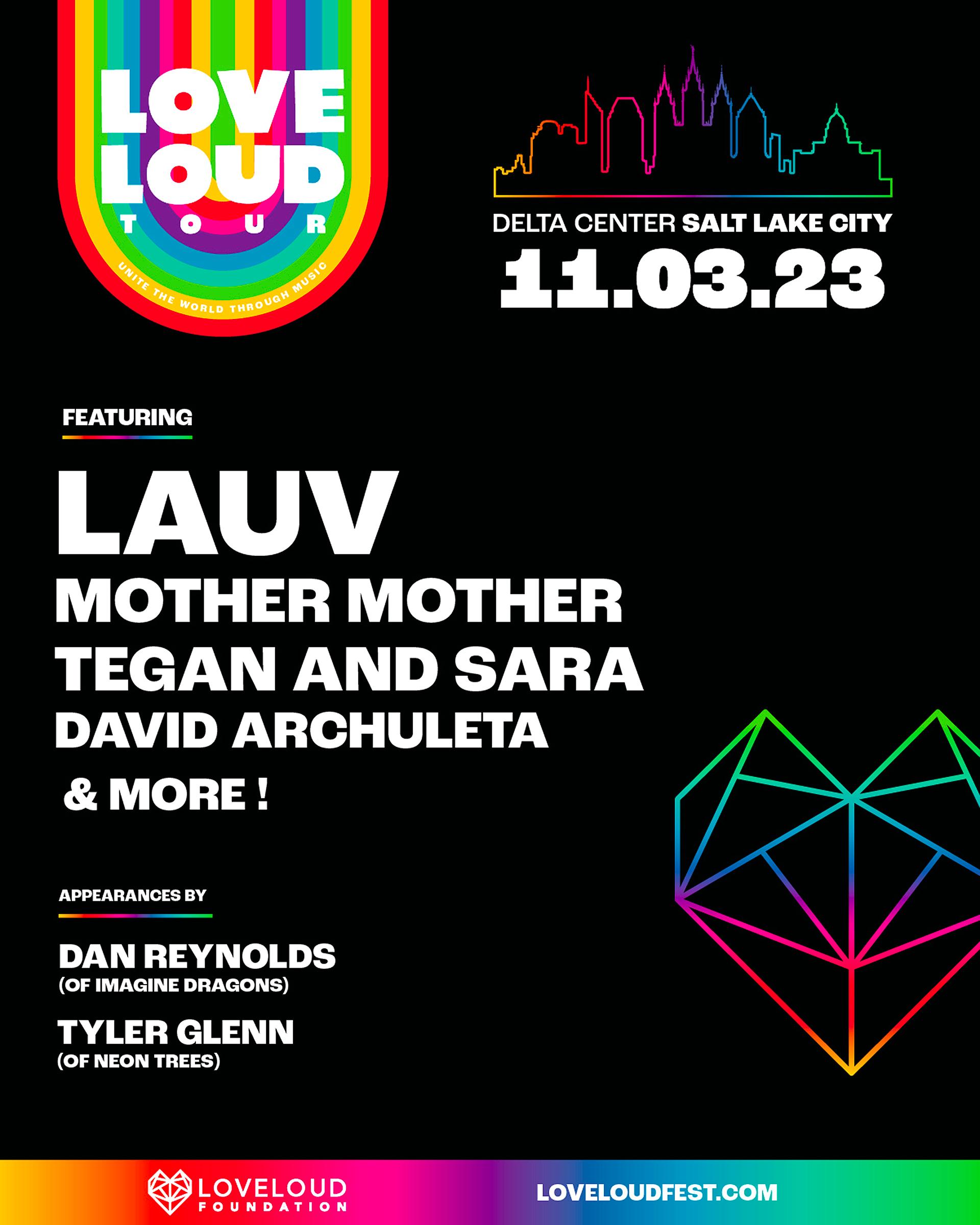
 BY CHRISTOPHER KATIS
BY CHRISTOPHER KATIS

Acouple of years ago, my uncle decided he had had enough of winters and keeping up a three-bedroom house, so he moved to a condo in Arizona. As he downsized his house, one of the items that was rehomed to our place was a steamer trunk in which my grandmother had kept her clothes when she immigrated to America.
Inside, we found a few old newspaper clippings, some photos, and a couple dozen doilies that she had crocheted. Now, honestly, these are amazingly beautiful examples of textile art, but doilies aren’t really our decorating style.

As I tried to decide what to do with them, Kelly reminded me that I could keep them all. But he added that one day I’d be gone, and the boys and their wives would have to deal with all these doilies — and they had no connection to my grandmother at all.
I was reminded of this conversation after stumbling across a reality television show called The Gentle Art of Swedish Death Cleaning. In the show, a therapist, an organizer, and designer, all from Sweden, help a person declutter their home so when they pass, it’s easier on their loved ones.


There are certainly items that all parents leave their kids that have special meaning — a ring, a teapot, whatever. But there are also many mementos from parents’ lives about which kids have no understanding. And I think that may be especially true for LGBTQ+ parents.
When we’re gone, will our boys, their wives, and their children look at the silver platter engraved with three dates and recognize the significance? Will they understand that those dates correspond to the dates when their dads got married — the latest one being the marriage that finally “stuck”? Will they recognize the historical significance of the second date, March 11, 2004?
It was on that date that we were among the last handful of couples legally married
in San Francisco after then-Mayor Gavin Newsome legalized it. Less than an hour later, the California Supreme Court halted any further marriages. Their dads were a part of history. Actually, so was a 10-month-old baby, Gus, whose image was broadcast around the globe as he was carried by his newly wedded dads down the grand staircase of City Hall.
Will they want to save the clipping from a San Francisco gay newspaper with a photo of their much younger dad protesting then-President Bill Clinton’s deci-
sion to sign the Defense of Marriage Act, or will it be tossed into the recycling bin? And speaking of gay newspapers, will they save 14 years’ worth of QSaltLake magazines in which this column has appeared?

Kids may well know why a parent has saved something but also be clueless about its significance. Sure, a platter with some dates on it reminds the boys it took their parents a couple of tries to make their relationship legal, but it is also a symbol of their grandparents’ acceptance and love for their fathers — tragically, that isn’t true for everyone. It’s also a reminder that the two lame guys they called “Papa” and “Dad” were willing to take to the streets to demand equality.
In the end, I kept a handful of those doilies and gave the remaining pieces to my mom — fully aware that I had only postponed a final decision on what to do with the rest of my grandmother’s artwork. For me, they are a small physical reminder of the love I felt from an amazing woman who encouraged me to be myself. And I’m certain the Swedish death cleaners would agree. Q

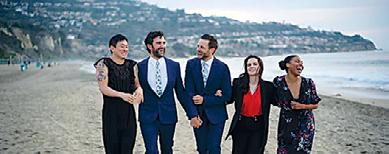
For20 years, Damn These Heels by Utah Film Center has provided Utah’s queer community with access to films and events that celebrate, inspire, and highlight queer stories, queer history, and queer joy. This year, they will present 20 feature films and 20 shorts to 2,000 filmlovers to celebrate 20 years from October 12–15.
Special guest MISS COCO PERU will participate in the celebration. With 33 years in the business as a working drag queen, Coco offers an evening of inspired storytelling and song followed by a moderated discussion with the audience. Their cult classic film, GIRLS WILL BE GIRLS will be screened after. Miss CoCo Peru will perform on October 13 at 7 p.m.
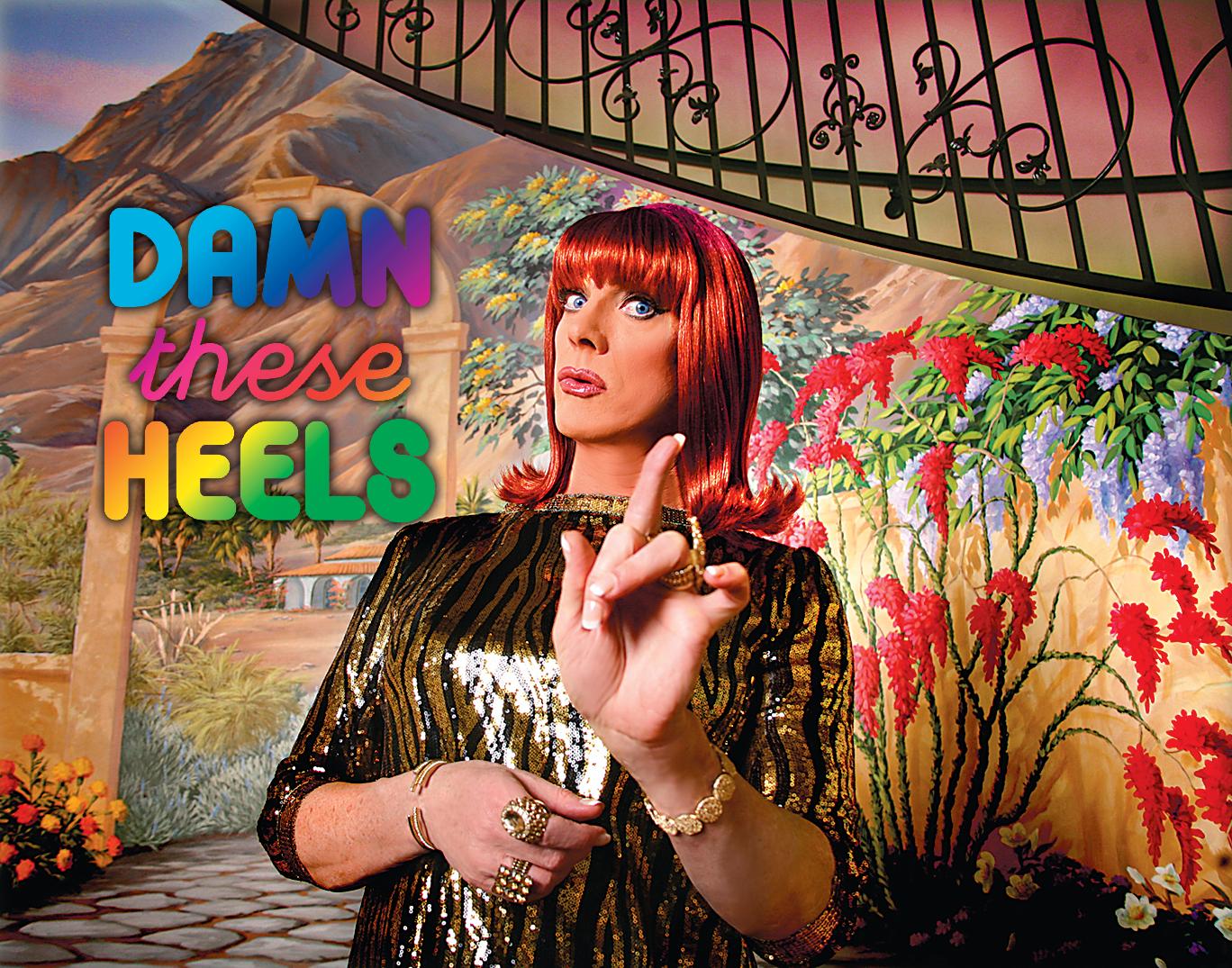
All events take place at the Rose Wagner Performing Arts Center at 138 West Broadway in downtown Salt Lake City. Tickets, passes and sponsorship possibilities are at damntheseheels.org.
90 MINUTES | USA | 2023
DIRECTOR/SCREENWRITER COREY
SHERMAN
A teenage boy’s unexpected crush turns a camping trip into a weekend of self-discovery in this heartwarming coming-of-age comedy.


Sat, Oct 14, 3pm, Jeanné Wagner
Utah Premiere
134 MINUTES | ITALY | 2023
DIRECTOR: GIUSEPPE FIORELLO, SCREENWRITERS: FIORELLO, ANDREA CEDROLA, CARLO SALSA
1982, in the heat of a Sicilian summer, two teenage boys, Gianni and Nino, meet and fall in love. The relationship soon becomes a topic of gossip in the small town and while the two dream of living together, their community is determined to stop it.

Sat, Oct 14, 8pm, Jeanné Wagner
Utah Premiere
120 MINUTES | CANADA | 2022
DIRECTOR: JASON KARMAN, SCREENWRITER: GORRMAN LEE
When basketball-obsessed Aleks moves in across the street, Asian-Canadian teen Jake finds himself trying out for the basketball team to get his attention in this classic coming-of-age drama set in the digital age.

Sun, Oct 15, 3pm, Jeanné Wagner
Utah Premiere
98 MINUTES | FRANCE | 2023
DIRECTOR: OLIVIER PEYON, SCREENWRITER: PEYON, VINCENT POYMIRO, CÉCILIA ROUAUD, ARTHUR CAHN (BASED ON A NOVEL BY: PHILIPPE BESSON)
Novelist Stéphane Belcourt returns to the city of his you, where he meets Lucas, the son of his first love. Memories flood in: irrepressible desire, bodies coming together, a passion that must be silenced?
Sat, Oct 14, 10am, Jeanné Wagner
Utah Premiere
The Mattachine Family
99 MINUTES | USA | 2023 | DIRECTOR: ANDY VALLENTINE, SCREENWRITER: DANNY VALLENTINE
Thomas and Oscar are a couple very much in love, but after their first foster child returns to his birth mother, they find they have different ideas about what it means to make a family.
Sat, Oct 14, 7:30pm, Black Box
Utah Premiere
101 MINUTES | USA | 2020
DIRECTOR: MORGAN INGARI
Listless Milo becomes the surrogate for an older gay man she meets at a bar. As the pregnancy progresses, she must contend with the implications of their evolving relationship.
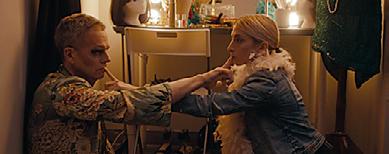
Fri, Oct 13, 4pm, Black Box
Utah Premiere
87 MINUTES | USA | 2022
DIRECTOR/WRITER: VUK LUNGULOV-KLOTZ
Feña, a young trans guy bustling through life in New York City, is afflicted with an incessantly challenging day that resurrects ghosts from his past.
Sun, Oct 15, 10:30am, Black Box
100 MINUTES | USA | 2021 DIRECTORS/SCREENWRITERS CARL ANDRESS, CHARLES BUSCH
A down-on-his-luck movie collector discovers a legendary lost film and must deliver it to the right hands before it is lost forever.
Sat, Oct 14, 10:45pm, Jeanné
Wagner
Utah Premiere
70 MINUTES | SPAIN | 2023 | DIRECTOR/WRITER ÁNGEL FILGUEIRA
Mariña has an intense love affair with Ada when Tomás, a mutual friend, enters the couple’s intimacy. Six moments of the relationship articulate the film, thrown like flashes of light.


Streaming Oct. 15–22
and a straight activist make a shocking discovery: An erroneous translation in the Bible that has been weaponized against the LGBTQIA+ community ever since.
Oct. 15, 12:30pm, Jeanné Wagner
82 MINUTES | USA | 2022
DIRECTOR: RAY WHITEHOUSE
Growing up, Frankie Gonzales-Wolfe learned to be a fighter, but never imagined having a chance to make history as the first openly elected transgender official in Texas.
Thu, Oct 12, 7pm, Jeanné Wagner
80 MINUTES | USA | 2023
DIRECTOR: NICOLE HAWKINS
In Provo, Utah, a group of self-proclaimed misfits seek alternative methods of devotion and community through weekly karaoke singing.
Streaming Oct. 15–22
68 MINUTES | SPAIN | 2022 DIRECTOR: PAU CANIVELL

The coexistence of a family of drag queens and a trans woman who travel by motorhome to Murcia, Spain to show their support for a child who was assaulted by another minor at the gates of his school.


Sat, Oct 14, 5pm, Black Box
92 MINUTES | US | 2022 | DIRECTOR: SHARON “ROCKY” ROGGIO
While uncovering the origins of homophobia of the conservative church, a gay seminary scholar

73 MINUTES | USA | 2023
DIRECTOR: D. SMITH
In the wildly entertaining and
refreshingly unfiltered documentary Kokomo City, filmmaker D. Smith passes the mic to four Black transgender sex workers in Atlanta and New York City.
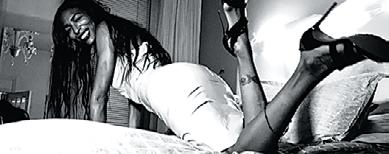
Sat, Oct 14, 5:30pm, Jeanné Wagner

98 MINUTES | FRANCE/RUSSIA | 2022 DIRECTOR: AGNIIA GALDANOVA
Gena, a queer artist from a small town in Russia, stages radical performances in public that become a new form of art and activism and put her life in danger.
Fri, Oct 13, 1:30pm, Black Box
Utah Premiere
87 MINUTES | US, CANADA, INDIA | 2023 | DIRECTOR: KY DICKENS Women have been shut out of the financial world, making it almost impossible to get their ideas and inventions funded. This film is a compelling and crucial reminder that money is power and women need it to achieve true equality in business.
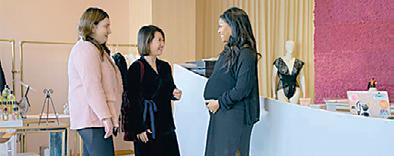
Sun, Oct 15, 3:30pm, Black Box
Utah Premiere
77 MINUTES | BRAZIL | 2020 DIRECTOR: CORACI RUIZ, SCREENWRITERS: LUIZA FAGÁ, RUIZ

An autobiographical documentary by a mother who interviews her transgender son as he comes to his identity, addressing the conflicts, certainties, and uncertainties amidst a deep search for his true self.

Streaming Oct. 15–22
95 MINUTES | USA | 2022
DIRECTOR/WRITER: YUVAL DAVID
As religious discrimination against LGBTQ+ people intensifies in the US and abroad, a team of creatives upends 1700 years of religious iconography by producing photo art depicting Jesus as a member of the LGBTQ+ community.
Sun, Oct 15, 10am, Jeanné Wagner
Utah Premiere
14 MINUTES | USA | 2023
DIRECTOR: DANIEL SOUSA, DEAN HAMER, JOE WILSON. SCREENWRITER:DEAN HAMER
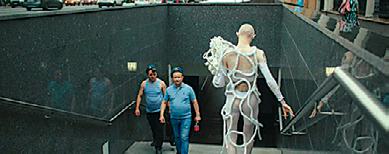
A valiant island warrior, wounded in battle against foreign invaders, falls into a mysterious underwater world. When the octopus who rescued him transforms into a handsome young man, they become aikane, intimate friends bound by love and trust, and an epic adventure begins.

Sat, Oct 14, 12:30pm, Jeanné Wagner
Utah Premiere
6 MINUTES | CROATIA | 2023
DIRECTOR/WRITER: MATEA KOVA
An empty paper depicts a struggle between artistic composition and decomposition as the voice of the narrator-protagonist reminisces about her tumultuous relationship with a former girlfriend.

Sat, Oct 14, 12:30pm, Jeanné
Wagner
Utah Premiere
40 MINUTES | USA | 2023 DIRECTOR/WRITER AMANDA
MADDEN
Braiding together embodied exploration, spell songs, stories and wisdom from queer and trans folks across the country, the film asks- what does it mean to be at home as a queer person?
Sun, Oct 15, 1pm, Black Box
14 MINUTES | USA | 2023 DIRECTOR/WRITER: NYALA MOON
A whack, irreverent comedy about a black trans woman who tries to dilate, after four years of not dilating, to hook up IRL with her online boyfriend.
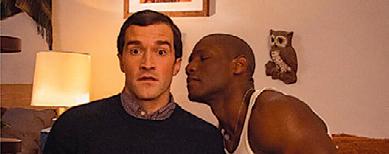

Thu, Oct 12, 7pm, Jeanné Wagner
Utah Premiere
16 MINUTES | ISRAEL | 2022
DIRECTOR/WRITER: NIV MANZUR
Ronit throws her son Nadav a grandiose surprise party, celebrating a year anniversary of his coming out of the closet. However, he struggles to cooperate. Happy BirthGay is a sad farce about the mother’s closet, rather than the son’s.
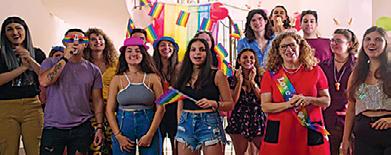
Sun, Oct 15, 1pm, Black Box
North American Premiere
Utah Premiere
16 MINUTES | ECUADOR | 2022 DIRECTOR: ESTEBAN VERA, SCREENWRITERS: VERA, SALVADOR YUGCHA

Martina, a young novice, helps priest Francisco with funeral masses but must confront her own fears and past in the LGBTQ+ community after the death of drag queen Aphrodite, leading her to embrace love and authenticity.

Sun, Oct 15, 10am, Jeanné Wagner World Premiere
12 MINUTES | CANADA | 2023 DIRECTOR/WRITER: SIMON PALUCK
A gay millennial reels after breaking-up with a popular influencer.
Sun, Oct 15, 1pm, Black Box
15 MINUTES | USA | 2022 DIRECTOR/WRITER: BRYDIE O’CONNOR
A touching tribute to the pioneering lesbian experimental filmmaker, Barbara Hammer, told through the lens and love of her partner of over 30 years.

Streaming Oct 15–22
Utah Premiere
her daughter begins puberty. Their bodies’ changes make going to the beach a new chore.
Sat, Oct 14, 12:30pm, Jeanné Wagner
North American Premiere
6 MINUTES | USA | 2023
DIRECTOR: RANCE COLLINS
A nervous young gay man has an eye-popping first experience hosting a hookup.
Utah Premiere
90 MINUTES | USA | 1976
DIRECTOR: RICHARD LESTER, SCREENWRITER: TERRANCE MCNALLY

Evading a mob contract on his life, a straight man winds up hiding out at a gay bathhouse.
Sat, Oct 14, 10pm, Black Box
Shafted
19 MINUTES | USA | 2023 DIRECTOR: DEL SHORES & EMERSON COLLINS, SCREENWRITER: MAT HAYES
This standard romantic comedy about finding love in an elevator falls apart when the filmmaker is forced to step out of the fantasy and decide whether he believes in the story he’s telling.

Sun, Oct 15, 1pm, Black Box , Streaming Oct. 15–22
Utah Premiere
16 MINUTES | SPAIN | 2023 DIRECTOR: ANA BELÉN BARRAGÁN CASTAÑEDA, SCREENWRITER: ANA BELÉN BARRAGÁN CASTAÑEDA


A transgender mother resumes her hormone treatment while
4 MINUTES | AUSTRIA | 2023 DIRECTOR/WRITER: DANIELA GUTMANN

A fluid examination of physical closeness, which matches itself in repetitions, reflections as well as irregularities.

North American Premiere
Stone
14 MINUTES | UK | 2023
DIRECTOR: JAKE AND HANNAH GRAF, SCREENWRITER: JAKE GRAF

A young woman’s discovery that her father was a transgender woman makes her rethink her childhood.
Sat, Oct 14, 12:30pm, Jeanné
Wagner
Utah Premiere
We All Die Alone
13 MINUTES | USA | 2022
DIRECTOR: JONATHAN HAMMOND, SCREENWRITERS: HAMMOND & RYAN ROACH
The hubris of an inept conflict negotiator leads two warring gangs into an 8-way standoff. The consequences are both comical and tragic in this whipsmart short.
Sat, Oct 14, 7:30pm, Black Box
Utah Premiere
Apayauq
17 MINUTES | USA | 2023
DIRECTOR/WRITER: ZEPPELIN ZEERIP
Apayauq Reitan’s journey of gender, mental heal, and purpose on her way to become the first out transgender woman to complete the legendary Iditarod sled dog race.

Sat, Oct 14, 12:30pm, Jeanné
Wagner
Utah Premiere
Utah. Join a group of local SLC queens through their ups and downs, local pressures from a conservative environment, and celebrate the art of drag.
28 MINUTES | USA | 1981 | DIRECTOR: ROB EPSTEIN, FRANCES REID, GRETA SCHILLER AND LUCY WINER
A kaleidoscope of music, dance, stories and laughter shared at the first Gay and Lesbian Rights March on Washington in 1979. Sat, Oct 14, 12:30pm, Jeanné Wagner

Utah Premiere
14 MINUTES | USA | 2022
DIRECTOR: FLETCHER GIBBONS
Five queer past and present BYU students tell of their struggle to live truthfully to themselves and their identities while trying to avoid academic and social backlash from the conservative Mormon University. Collectively they tell a story of queer struggle and the safety and security that can be found in community.
17 MINUTES | USA | 2022
DIRECTOR: DEVIN D BOSS
Exploring of a three-story high mural in downtown Portland, Ore. dedicated to the Queer community. Streaming Oct. 15–22
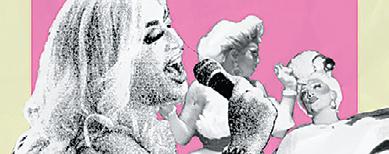
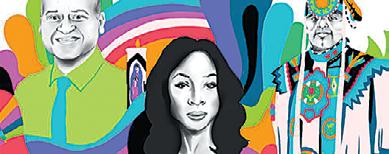
17 MINUTES | USA | 2022
DIRECTOR: RILEY NICKEL, SCREENWRITERS: NICKEL, ELEANOR CONDIE
A vibrant documentary following local drag in the scene of
Sat, Oct 14, 5pm, Black Box, Streaming Oct. 15–22
All events at the Rose Wagner Center for Performing Arts, 138 W 300 S

Thursday, Oct. 12

7pm A Run for More, and Dilating for Maximum Results
Jeanné Wagner Theatre
Friday, Oct. 13
1:30pm Queendom Black Box
4pm Milkwater Black Box
7pm Special Event: An Evening with Miss Coco Peru
Jeanné Wagner Theatre
9pm Girls Will Be Girls
Jeanné Wagner Theatre
Saturday, Oct. 14
10am Lie with Me

Jeanné Wagner Theatre
10am Workshop: Video SelfPortrait (Beginner Level) Black Box
Noon Community Event: Banned Book Reading & Book Swap, Rose Room
12:30pm Saturday Short Film Program — Y, Apayauq, Greetings From Washington DC, Aikane, Mama Doesn’t Want to Go to the Beach, Stone
1:30pm Workshop: Directing Films, from the POV of an Editor (Int. to Adv. Level) Black Box

3pm Big Boys
Jeanné Wagner Theatre
5pm Heels Over Wheels, and Queen Bees Black Box
5:30pm Kokomo City
Jeanné Wagner Theatre
7:30pm The Mattachine Family, and We All Die Alone Black Box
8pm Fireworks
Jeanné Wagner Theatre
10pm The Ritz Black Box
10:45pm The Sixth Reel
Jeanné Wagner Theatre
Sunday, Oct. 15
10am Wonderfully Made Jeanné Wagner Theatre
10:30am Mutt Black Box
12:30pm 1946: The Mistranslation that Shifted Culture
Jeanné Wagner Theatre
1pm Sunday Short Film Program: Shafted, Insta Gay, Happy BirthGay, A Spell For Queer Home Black Box
3pm Golden Delicious Jeanné Wagner Theatre
3:30pm Show Her The Money Black Box
Starting Sunday Oct 15 at 12am: Empty Orchestra
Love, Barbara
Never Look Away
Rooted
Stroking An Animal Threshold
Starting Monday Oct 15 at 12am: Queen Bees
Shafted
Tickets and updated information can be found at damntheseheels.org.
October is LGBTQ+
Month, and we celebrate with a series of article, collected by our sister publication, Philadelphia Gay News. Our first story is by founder and editor Mark Segal, who was at Stonewall the fatefull night of June 28, 1969.

For years, people have debated what actually happened that night in June 1969 when Stonewall was raided, and a new, more militant struggle for equality was born. Due to the debates, and the insistence of some who claim they knew all aspects of what had actually happened, an incredible void opened up where people could invent, imagine, or distort Stonewall and our history to their own objectives. The myths of Stonewall are endless, but they’re easily dispelled when you look at the material proof and plain logic.
The myth of Judy Garland’s death being the impetus for Stonewall is the most belittling myth to those of us who participated. It’s stereotypical and self-loathing, and with this article, we add new infor-
mation that finally ends this silly tale.
One clue is where the idea originated: from a conservative, straight columnist at the Village Voice named Howard Smith, who actually was a friend of the police captain who led the raid.
Simple logic says it’s just not so. People of my age, late teens and early twenties at the time, were not dancing to Judy Garland in the Stonewall. We were dancing to Diana Ross, the Beatles, and Barbara Streisand. My best memory is dancing to the Fifth Dimension song “Let The Sunshine In,” which is from the musical “HAIR.” Judy Garland was of an older generation. We wanted to dance our asses off when we were in Stonewall, and that you didn’t do to Garland’s music.
But the final nails in the Judy Garland myth are articles about the funeral at Campbell’s Funeral Home. If you look at the photos and reports in the New York Times, as well as other newspaper reports, you’ll note that the subjects in the photos, as well as the majority of quotes, are from housewives. When you look more closely at the very few men in the photos, they’re in suits and ties. We all know that is not the kind of person who fought at Stonewall. Men who wore suits and ties ran from the police for fear of losing their good-paying jobs or their families finding out about them. They were not the ones who resisted.
It’s time to bury the Judy Garland myth for good. The myth makes Stonewall sound like the only riot in U.S. history where its participants fought for a silly cause. The truth is that we were fighting the hate and oppression of the police that night. We were not empowered by a dead singer. Let’s put that coffin into the ground already.
I was recently filming a BBC television show in front of the Stonewall when a tour group came by. The guide stated, “There were 105 people in the bar that night.” But nobody can possibly know how many people were there. Some people paid for entry, and some were regulars who were let in without the door charge. But that number does give an idea of the average size of the crowd inside.
Then, as we all know, once police began letting people outside, those with any standing in society ran for the hills as soon as they could. Those of us who remained — street kids, drag queens (later to be called trans), people of color, and the verging radical gay youth of the day — gathered around the door in a semi-circle
There were hundreds of passersby and even more who craned their necks from a distance. That night went on for hours, so anyone who was within a few blocks could say they were at Stonewall that night. But actually participating is another matter. Anyone who says they know how many people were there must not have actually been there, since it occurred in various areas of Christopher Street and around Christopher Street. You don’t take a roll call in the middle of a riot.
Those people who tossed stones or cans of soda, or those who wrote on the streets and walls “Tomorrow Night Stonewall” as I did, went on to be a part of Gay Liberation Front which arose from the ashes of Stonewall. Some GLF members were there during the first night. Other GLF members stood and spoke from the doors of the closed stonewall the second night. More GLF members began leafleting the following nights.
So who can we say was there? Well, anyone who had family in the area or a decent job ran for the subway or a cab as soon as they were let out of the bar. Who was left? Drag queens, stereotypical gay men and women, street kids like me who were homeless or living at the YMCA, and young activists like Marty Robinson. Since the riot created the urgency for change, Gay Liberation Front picked up that mantle and ran with it; Stonewall and GLF are synonymous. When asked who was there at Stonewall, my answer is: Who was there the following night and the night after that? Who carried out that change through that first turbulent year? We have pictures and written accounts. This is no myth. There are facts in plain sight.
There have been numerous suggestions about how long Stonewall lasted. At one museum I was speaking at during
the opening of their Stonewall Rising exhibit, they had a sign that stated one number. Then, someone else wrote about the exhibit and put another number. When I’m asked that question, I say confidently that Stonewall went on for 365 days, from the first night until the first Pride one year later. That spirit in June 1969 carried on with the changes that Gay Liberation brought from it. We were self-identifying ourselves for the first time in history. We were out, loud, and proud rather than in the closet. We took back our streets from the police. We organized legal and medical alerts. We had social and political meetings. All of that threatened the police since much of it was illegal for “homosexuals,” and we did it in plain sight and even advertised it. We dared the police to stop us. One last thing: we were diversified and inclusive. It took 365 days to create that change.
It is often stated that my fellow GLF member, Sylvia Rivera, threw the “first brick” at Stonewall. Although it’s flashy and bombastic, that myth actually does not give her her rightful place in history. Both Sylvia and her GLF sister Marsha P. Johnson have spoken about where they were during Stonewall, and people today have either ignored their words or distorted them. But what cannot be disputed is that Sylvia and Marsha did something much more important than throwing an imaginary brick: they created the world’s first trans organization, Street Transvestite Action Revolutionaries. STAR gave visibility and pride to the Trans community for the first time in history. STAR was not one night but an entire movement. Sylvia is more of a historical figure for co-creating that first Trans organization than for being just one of a crowd at Stonewall. That cannot be disputed. And if you’re still hung up on the brick idea, the New York Times did a video dispelling it in 2019.
Here is an answer that is well documented and known by each of us who lived this history. The two people who actually came up with the idea of Pride
were Craig Rodwell and Ellen Broidy. They were having dinner in Rodwell’s apartment with their partners at the time, and they began putting down a resolution that would be read at the Eastern Regional Conference of Homophile Organizations meeting in Philadelphia. That resolution created the Christopher Street Gay Liberation Day committee, which went on to organize that first Pride one year after Stonewall.
It is often reported that the “mother” of Gay Pride is Brenda Howard. That is absolutely false. There are numerous members of Gay Liberation Front or Christopher Street Gay Liberation Day committee who are alive today. We know, because we were there when it took shape, who created Pride. If anyone is going to be deemed “mother of Pride” it’s Ellen Broidy. Brenda Howard was a member of GLF, but she was not in any way associated with the formation of that first Pride other than to march in it. She may have someone editing Wikipedia on her behalf, but that doesn’t make that falsehood any less false.













































There are many views of Stonewall, but the majority of its participants went on to form GLF. They — we — are the spirit of Stonewall. Each GLF member who was there relies on their personal memories, and those memories











collectively weave a fuller picture. Numerous books on the subject have been written. There are two books that stand out. The first book written on the subject was Donn Teal’s The Gay Militants in 1971. The other is David Carter’s Stonewall, published in 2010. While Carter’s version has some flaws, it comes closer to any version before or after. He wrote at a time when our community was beginning to realize the importance of Stonewall historically, and at a time that many different viewpoints took hold. He literally had to duck to keep out of the way of warring parties on the subject, which can be seen in other books.


Carter continued to research the issue and had a passion to find the missing points and bring facts forward until his death in 2020. Others (who were not at Stonewall, mind you) unfortunately write with their bias at the forefront. Many of us who were there continue to pass on lost information or leads. We feel that our personal battle that night has been used to reinforce people’s own misconceptions and political objectives.
It wasn’t that single night that changed and built our community. It was from the ashes of that night that Gay Liberation Front created self-identity, community, and pride. Change doesn’t happen overnight. In this case, the seeds of equality took 365 days to take root. It was that first magical year of gay liberation. Q
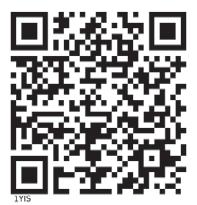
Mark Segal is an award-winning journalist, author, and Stonewall pioneer. More information on his 50-plus years of continuous activism can be found at marksegalstonewall.com.


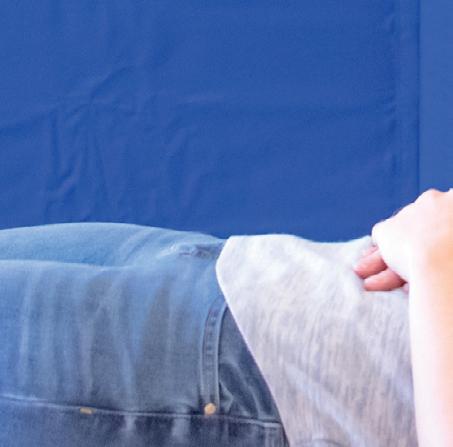






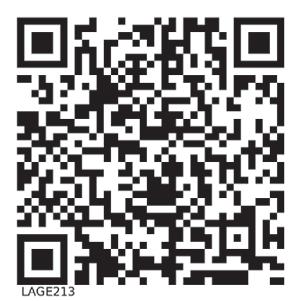
Fromcasual hookups to friendships to meeting the love of your life, LGBTQ+ online dating was created out of a need for community.
When I first messaged my wife of six years on OkCupid in 2014, I didn’t realize I was taking part in an online LGBTQ+ culture that first manifested in the early 1990s. I turned to dating apps specifically to find a romantic partner and to take the guesswork out of flirting with women in real life. But little did I know that the world of queer online dating and connection was born in part out of the need for solidarity between gay men during the early years of the HIV/AIDS crisis.
Andy Cramer, currently the CEO of Caregiving Network, launched the bulletin board system Gay.Net in December 1993. Bulletin board systems (BBSs) were the major online spaces. They were “local or regional dial-up networks –– often running on a single computer or a handful of them –– operated mostly by
hobbyists or enthusiasts,” writer and software engineer David Auerbach wrote in the Slate article, “When AOL was GayOL.” A lot of BBSs for gay men developed in the 1980s and 1990s, such as the Backroom and Gay.Net.
Cramer came up with the idea for Gay.Net after he had been operating several Headlines stores on Castro and Polk streets in San Francisco, which were “the epicenters of gay life,” he said. When HIV/ AIDS hit the U.S. in 1981, Cramer and his employees across ten stores became frontline workers over the next 14 years.
“We had fundraisers, we sold condoms for a penny,” Cramer said. “We did everything that we could do.”
Cramer thought about the thousands of people he helped over the course of a decade and a half, how he lost so many friends to AIDS, and how lonely that was for gay men who felt disconnected from the community.
“I went out and I bought a bulletin board system because, at the time, there was
nothing online,” Cramer said.
Cramer launched Gay.Net using a BBS software with graphical overlays and mailed out diskettes that allowed members to install the software. In the first year of its existence, 10,000 gay and bisexual men paid $10 a month to access Gay.Net, which was initially run on just 16 modems.
“We had Prodigy, we had AOL and Compuserve,” Cramer said. “They were all heavily censored. I wanted to open up a site where people could be who they were. People first put on fake pictures, then they put on avatars, and then they put on real pictures, but the real pictures contained all kinds of things.”
Cramer even met his husband of 27 years, Al Farmer, through Gay.Net. Farmer initially couldn’t log onto the platform for a month because it was so popular and its modems were always tied up. After Cramer eventually took Gay.Net onto the web, Farmer, a technology expert who worked for IBM at the time, would sign on
every day and help Cramer improve aspects of the site.
Cramer later merged Gay. Net with Gay.Com, which grew from 1 million to 4 million users in 1999. He left the company later that year, and it went public in 2004. The site went through numerous leadership changes before it was eventually sold to the Los Angeles LGBT Center.
“I’m proud of it to this day,” Cramer said. “We created the first site where people can go who were lonely and unsure of themselves to be able to go meet each other. Some people met each other in many different ways, but it really was the first dating site. Even to this day, I get people walking up to me saying ‘thank you, I got married because of you.’ And ‘thank you, I got my first boyfriend.’ I was very happy to bring four to six million people together.”
Even though Cramer had lesbian friends at the time, he didn’t know how to foster the same sense of online com-
munity for queer women, he said. But that doesn’t mean that there weren’t digital spaces for lesbians in the early to mid-1990s. Even before email became mainstream, email lists became very popular for the lesbian community. Jean Marie Diaz created Sappho in the U.S. in 1987, which was ground zero for lesbian lists at the time, Auerbach reported in Slate.
However, lists that were designated as solely for lesbians sparked “debates” regarding whether users felt comfortable with bisexual and trans women taking part, Amy Goodloe told Slate. Goodloe ran numerous LGBTQ+ lists and created lesbian.org in the mid-1990s, one of the first big lesbian websites.
In a NetCafe video interview housed on archive.org, Goodloe said she built the site “for women to be able to find each other; to be able to communicate with other women going through similar issues that they might be going through; to find other lesbians in their area, or women just struggling with their identity.” She made the site for “people who want information about coming out; people who want information about support groups in their area; what is it like to be a lesbian mom?”
She added, “I wanted it to be, more than anything, a place for a group of people who [don’t] have much visibility in the culture to come together and find each other and know that they’re not alone.”
Despite the existence of some online spaces and a variety of email lists for queer women, spaces for queer men continued to go full-steam
ahead in the ’90s. Services like Compuserve and AOL made it easier to get online by providing community forums and chat rooms, according to Auerbach. Later in the decade, AOL became rife with gay-centric chat rooms.
The website Gaydar, which launched in 1999, was another early mainstream gay dating site. It provided a space for queer men to talk to each other in chat rooms and one on one. “Gaydar was made to broadly appeal to guys wanting dates, relationships and just sex,” according to PinkNews. Gary Frisch and his partner Henry Badenhorst, two South African men who have since passed away, founded Gaydar.
Although more queer-specific dating apps popped up in the 2000s as the internet became more sophisticated, one of the early Web 2.0-era dating apps that attracted LGBTQ+ users was OkCupid, which came out in 2004. OkCupid matches people based on in-app questions, which are tailored for queer users and even vary for different sub-identities within the LGBTQ+ umbrella, said Michael Kaye, director of brand marketing and communications for OkCupid.
“I think LGBTQ+ people were always really early adopters to online dating,” Kaye said. “Speaking from experience, we are limited to the safe spaces that we have available. However, when we first launched [OkCupid] and still to this day, we’ve always positioned ourselves as a dating app for everyone — no matter how you identify, no matter what you’re looking for.”
OkCupid was the first dat-
ing app to expand gender and sexual orientation identifiers, which they fleshed out to 60 identifiers in 2021, thanks to a partnership with the Human Rights Campaign. The OkCupid team also works with GLAAD to expand pronoun options for users.
“We are seeing that with each generation, they’re becoming more and more fluid,” Kaye added. “They’re becoming more open with sharing their identity. Almost 20% of daters in the United States on OkCupid identify as LGBTQ+. This was up from 18% in 2022 and 17% in 2021.”
Dr. Timaree, sexologist, professor, writer, and human sexuality consultant, said she thinks it’s helpful for people to have as many options as possible when it comes to making connections.
“Whether you’re queer, poly, a parent, trans, have specific political beliefs, a positive STI status, a religious affiliation ––whatever –– there are advantages to putting these parts of your life front and center, even as they narrow your potential targets,” she said in an email. “An early example of this was when OkCupid let users choose to only be visible to other queer folks. If you’re a lesbian who doesn’t want to hear from a bunch of straight men, for example, that kind of option makes the experience of the site much better.”
GRINDR
The landscape of queer dating seemed to change again when Grindr came out in 2009, a men who have sex with men-centric dating app that probably needs no introduction. Co-launched by tech entrepreneur Joel Simkhai, Grindr was the first
geolocation dating app and one of the first third-party apps for the iPhone. It was created “as a casual dating app for the queer community,” said Grindr’s Chief Product Officer AJ Balance.
“Grindr is a community that welcomes anyone who wants to use the app,” Balance said. “We have users of all genders and sexualities who use the app. Queer men are the largest segment, but over time, we’ve seen more user segments adopt the app and then find value in it. Over time, Grindr has become really important to a lot of folks in the community. Many users do use it for casual dating, and users also find dates and longterm partners from the app.”
As its usership grew over the years, Grindr started to provide sexual health resources to its user base, including a blueprint for trans and nonbinary sexual health. The blueprint includes info on general sexual health concerns, the social determinants of health, sex work, and other topics. Grindr also provides resources like free HIV/STI home tests, information about DoxyPEP and vaccinations, and other connections to resources. This effort is part of the social justice program Grindr for Equality, which centers on “LGBTQ+ safety, health, and human rights worldwide,” according to its website.
However, Simkhai left Grindr in 2017 after spending years as its CEO, during a time when issues of transphobia, racism, and fatphobia permeated some of the app’s usership, NBC News reported in 2022. That year, Simkhai launched the dating app Motto, which
he created to try to stave off the culture of “toxicity and discrimination” that has pervaded queer dating apps, according to NBC News.
Balance, Grindr’s chief product officer, said that the team takes safety and privacy very seriously and takes measures to ensure that users’ experiences are safe and confidential.
“We have both technology and operational processes to ensure user safety and privacy, including both proactive and reactive components,” Balance said. “For example, we have very robust moderation capabilities where users can report incidents and our team responds quickly to help address them. We also take proactive steps to help identify and prevent any negative experiences that users could face on the platform.”
HER
Like Simkhai’s Motto, some queer dating app creators who have launched products a little more recently are making concerted efforts to be more inclusive of trans and nonbinary users. One such app is HER, which describes itself as a “FLINTA [female, lesbian, intersex, trans and agender] community and dating app.”
“At HER, we aim to create a secure space for queer folks to unapologetically be themselves and build meaningful connections,” HER founder Robyn Exton said in an email. “We have vigorous verification processes and community guidelines, all with user safety in mind.”
This year, the HER team upped the ante on its “no TERFs” policy, sent out user notifications, and publicly
conveyed an anti-TERF position on Lesbian Visibility Day, Exton said.
Before launching HER in 2015, dating for LGBTQ+ women had its challenges, Exton said.
“All of the online platforms for women were just reskins of sites built for gay men but turned pink, asking you how much body hair you had, or straight sites that were filled with guys asking you for a threesome. It felt crazy to me, at the time, that no one had truly made a dating product for women.”
Before rebranding the app to HER, Exton first released it as Dattch, which was solely a dating and hookup app designed for women seeking women. Exton found that Grindr was the first dating app that she thought created “an incredible experience for its users.”
“It was a huge inspiration for starting HER,” Exton said. “When we first came out, we were very similar to Grindr — very hookup-focused, and it didn’t really work for our community. We learned that the experience on so many dating apps was designed to serve men, including all the straight apps. There was just nothing out there that displayed the information women wanted to see, that connected the community, that resonated with the young queer women I knew.”
Currently, HER provides users with more content, events, and opportunities to connect with friends.
“We listened really carefully to what people were asking for, and as we realized so many people were using the
app to make friends,” Exton said. “We realized their needs sat so much further outside of dating, and we wanted to be a part of the total experience.”
Other dating apps exist that say they’re designed specifically for the trans community. One such app is Tser, “a trans dating app for transgender people and their allies to meet online,” according to its website. It also brands itself as a social community where trans folks can go to find friendship and support. The app website says that trans people created Tser.
However, Tser received mixed reviews on appfollow.com. One user said that despite the app not sending them notifications, “I’ve been pretty happy with this app so far. I can actually message people and see who messaged me for free, unlike other apps.”
Another user wrote on Appfollow that they found Tser to contain “highly transphobic language everywhere, both from users and creators.
Putting cis people in as ‘men’ and ‘women’ invalidates trans women and trans men as women and men. ‘Transsexual’ is an outdated term that many trans people find quite offensive and dehumanizing.”
Mary Richardson, who created the label-free LGBTQ+ dating app Bindr in 2022 with her business partner Brandon Teller, said they came up with the idea for it when “we felt like there wasn’t anywhere that we personally belonged in the dating scene.”
Bindr doesn’t prompt users to share their sexual orientation or gender identity, but they’re welcome to include
those details in their profiles. Richardson said that trans women approached her table at Pride events and told her that they don’t typically feel safe on dating apps, but they would feel safe using Bindr because they know she’s in charge of it. Richardson reads every user support ticket herself, she said.
“My main goal is for transgender, nonbinary, everybody in between, all of these [lesser] known sexualities and gender orientations to have somewhere they can go and feel safe and not discriminated against,” Richardson said.
More of every kind of niche dating app exists these days, and because more and more people identify as part of the LGBTQ+ community, there are more queer-specific dating sites and apps in recent years, Dr. Timaree said.
“Whether it’s better or easier now is a matter of personal opinion,” she said. “More choices mean more opportunities, but it also means a dilemma of too much choice. Dating apps create a marketplace-like dynamic where we’re more prone to see each other as products. We try to optimize what we get and we treat each as more disposable.
“For most of history, we met people at work, friends or family. There was an obligation to be baseline polite to each other, [with] some accountability. Now you can talk to someone for weeks and then stop communicating suddenly without warning. It’s harder to be open to real connections when we’re guarding ourselves from that.”











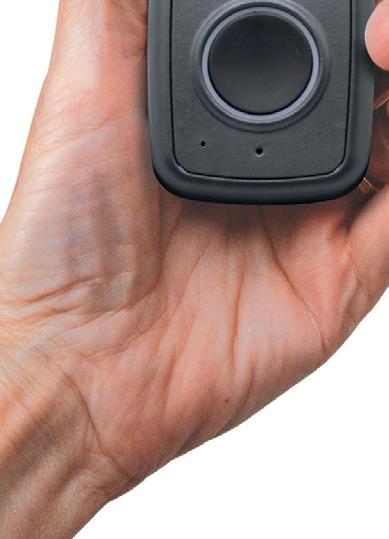



MobileHelp® allows you to summon emergency help 24 hours a day, 7 days a week by simply pressing your personal help button. Unlike traditional systems that only work inside your home, a MobileHelp medical alert system extends help beyond the home. Now you can participate in all your favorite activities such as gardening, taking walks, shopping and traveling all with the peace of mind of having a personal alert system with you. MobileHelp, the “on-the-go” help button, is powered by one of the nation’s largest cellular networks, so there’s virtually no limit to your help button’s range.





No landline? No problem! While traditional alert systems require a landline, with the MobileHelp system, a landline is not necessary. Whether you are home or away from home, a simple press of your help button activates your system, providing the central station with your information and location. Our trained emergency operators will know who you are and where you are located. If you’re one of the millions of people that have waited for an alert service because it didn’t t your lifestyle, or settled for a traditional system even though it only worked in the home, then we welcome you to try MobileHelp. Experience peace of mind in the home or on the go.

of The National Women’s History Museum describes Betty Friedan as “co-founder of the National Organization for Women” and “one of the early leaders of the women’s rights movement of the 1960s and 1970s. Her 1963 best-selling book, “The Feminine Mystique,” gave voice to millions of American women’s frustrations with their limited gender roles and helped spark widespread public activism for gender equality.”
The 1964 Civil Rights Act had banned sex discrimination in employment, yet the Equal Employment Opportunity Commission, the government agency that had been established to enforce workplace equality, did not acknowledge the sex-discrimination clause, effectively nullifying the Civil Rights Act’s addition of gender.
As NWHM details, Freidan’s groundbreaking book “helped transform public awareness” of such discrimination and propelled Friedan into the leadership of the nascent women’s liberation movement, where she was often referred to as the “mother” of second-wave feminism.
In 1966, Friedan, Pauli Murray, and Aileen Hernandez co-founded NOW. Friedan, as NOW’s first president, authored the organization’s mission statement: “…to bring women into full participation in the mainstream of American society now, exercising all the privileges and responsibilities thereof in truly equal partnership with men.”
Among the objectives of NOW were “securing the enforcement of anti-discrimination law; gaining subsidized child care, abortion rights, and public-accommodations protections; and passing the Equal Rights Amendment.
NOW was able to bring about changes large and small — to hiring policies, to credit-granting rules, to laws — that improved the lives of American women.”
NOW was itself a groundbreaking organization, which made Friedan’s purging of lesbians from that organization in 1970 — after calling lesbians the “lavender menace” in an interview with the New York Times magazine — significant on a myriad of levels. That action effectively separated lesbians from mainstream feminism, just as they had been separated by gender from the decidedly male gay liberation movement.
NOW’s Susan Brownmiller, whose book “Against Our Will: Men, Women, and Rape” would become another critically important feminist treatise, tried to make a joke of Friedan’s comment by calling it a “lavender herring,” but that just further alienated
lesbians in the organization.
Mainstream media had already dismissed the feminist movement as “a bunch of bra-burning lesbians,” so Friedan and other straight feminist leaders were acutely sensitive to this labeling — and dismissal — of all feminists as lesbians. Friedan wanted “feminine feminists” in the movement.
Friedan, like many straight feminists, did not want feminism associated with and tainted by “man-hating” and lesbianism. As lesbian activist Karla Jay later wrote in her memoir, “Tales of the Lavender Menace: A Memoir of Liberation,” “I’m tired of being in the closet because of the women’s movement.”
The blatant hostility toward lesbians and the move by Friedan and others to disassociate the feminist movement from lesbianism took on its own activism. NOW established policies that were exclusionary of lesbians in the early years of the organization. NOW newsletter editor Rita Mae Brown stated that “lesbianism is the one word which gives the New York NOW Executive Committee a collective heart attack.”
The lesbian purge at NOW was momentous and had a ripple effect on lesbian activists. It was also surprising and even ironic as lesbians had been so pivotal in the founding of NOW and in the impact and influence of second-wave feminism. Many of the key figures of that wave of feminism and of NOW itself were lesbians. This included NOW co-founder Pauli Murray; then-lesbian theorist Rita Mae Brown, member of The Furies collective and author of the first mainstream lesbian novel, “Rubyfruit
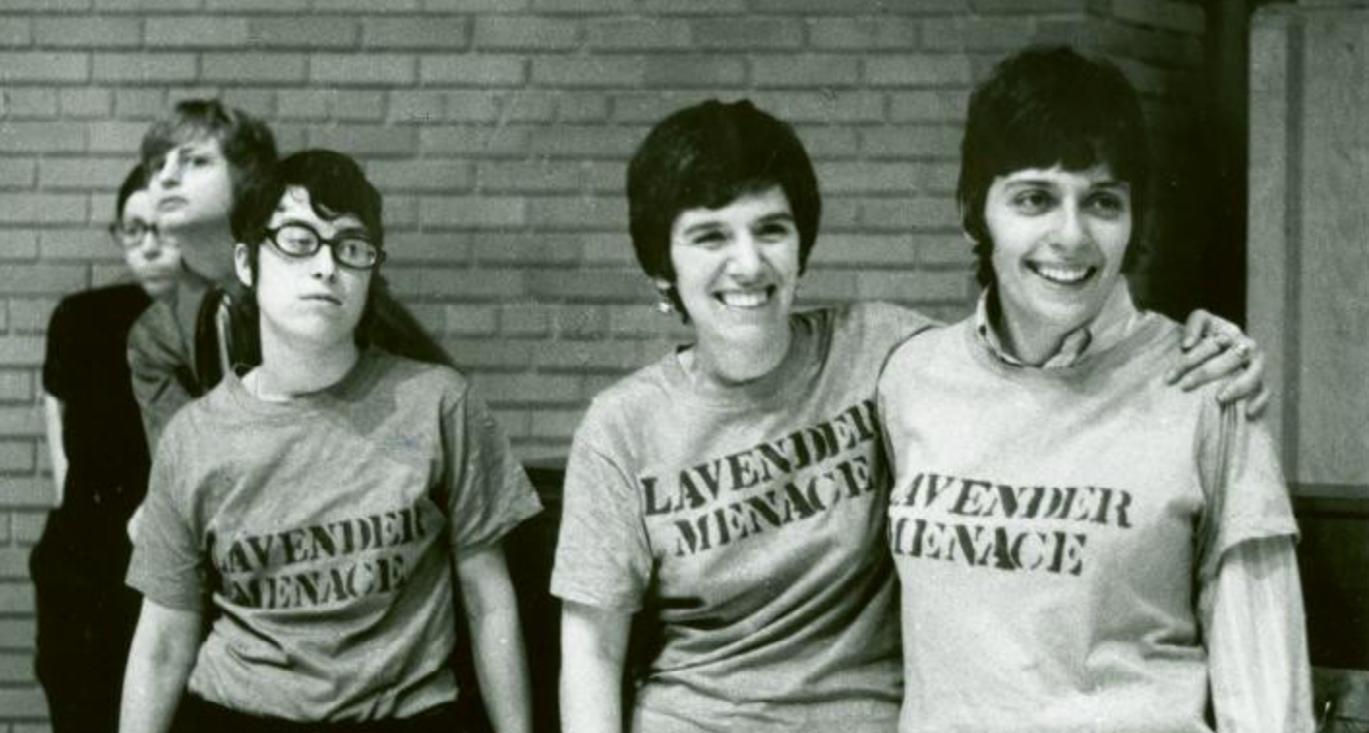
Jungle” and editor of the NOW newsletter; and graphic designer Ivy Bottini, who designed NOW’s logo (still used today) and was president of the largest chapter of the organization, New York NOW.
Yet the taint of the “lavender menace” was perceived by Friedan and other straight feminists, Shirley Chisholm and Gloria Steinem among them, to be problematic: lesbians were perceived as “man-hating” and mainstream feminism was intent on presenting the movement as pro-woman, not anti-male. Lesbians were still viewed as perverts and even as mentally ill. It would be several more years before the psychiatric community’s DSM would change its view that homosexuality was a mental disease.
As Hannah Quayle wrote in a blog post about the purge, “Lesbians were placed within an unnatural category of the ‘third sex.’ This ‘third sex’ was associated with a gross abnormality that violated female anatomy, heterosexual desire, and gender behavior by associating masculine features with the female body. In this sense, lesbians were not considered ‘real women,’ and stood outside the category of ‘woman’ in a physical, sexual, personal and political sense.”
Quayle asserted that within the mainstream feminist movement and NOW, “Lesbians had to find an effective way to address the accusation that their masculinity was somehow complicit with men and the patriarchy and that lesbian influence would not in fact dismantle strict heterosexual categories as it was widely believed. Heterosexual feminists excluded lesbians from the feminist movement in the 1960s based on this discom-
fort towards their sexuality.”
In 1969, the same year as the Stonewall riots, the president of the New York chapter of NOW, Bottini, broached the subject of lesbianism and the movement in a public forum titled, “Is Lesbianism a Feminist Issue?” Bottini — like Brown, Murray, and others — thought lesbians were leaders of the feminist movement, not background players. It was lesbians like Susan B. Anthony, who had also led the first wave of feminism in the U.S.
But Friedan was adamant that lesbians not derail the feminist movement and the work that she and others were doing to establish equity in employment and reproductive rights (Friedan was also co-founder of NARAL). Lesbian visibility, Friedan believed, would allow men to dismiss the feminist movement as fringe and something most women didn’t want to be associated with. Trumpeting her assertions and coining the term “lavender menace” (which a group of New York lesbians would later adopt to form a group of radical activists), NOW president Friedan fired openly lesbian newsletter editor Rita Mae Brown.
Friedan then orchestrated the purge of lesbians, including Bottini, from NOW’s New York chapter. That action did not go unremarked. At the 1970 Congress to Unite Women, 400 feminists from NOW and elsewhere were in attendance. Brown, Bottini, Karla Jay, and a dozen other lesbian feminists marched to the front of the auditorium wearing T-shirts that read “Lavender Menace.”
One of the women, Charlotte Bunch, who was also a member of The Furies collective with Brown, read
the Lavender Menace’s manifesto, “The Woman-Identified Woman.” That paper was considered the first major lesbian feminist statement. That action was among the first to challenge the heterosexism of heterosexual feminists and to present lesbians not as that “lavender menace” or mentally ill perverts, like the DSM defined them, but rather as more feminist than anyone, because they were women independent from and unconnected to men and to compulsory heterosexuality.
In the treatise, the “woman-identified woman” defined herself without reference to male-dominated societal structures. She “gained her sense of identity not from the men she related to, but from her internal sense of self and from ideals of nurturing, community, and cooperation that she defined as female.”
Later Bunch would write, “It is the primacy of women relating to women, of women creating a new consciousness of and with each other, which is at the heart of women’s liberation, and the basis for the cultural revolution,” articulating the principle of the woman-identified woman that would become a cornerstone of lesbian activism in the 1970s in the post-purge feminist movement.
Friedan’s action did not end with that Lavender Menace demonstration at the Congress to Unite Women. Pushback from within NOW’s ranks resulted in a near-embrace of lesbians within NOW just two years post-purge. In 1971, NOW passed a resolution declaring “that a woman’s right to her own person includes the right to define and express her own sexuality and to choose her own lifestyle [sic].” There
was also a conference resolution about lesbian mothers that declared it was “unjust” to force lesbians to remain in heterosexual marriages or remain closeted to keep custody of their children.
The NOW Task Force on Sexuality and Lesbianism was established in 1973, and NOW resolved to introduce and support civil rights legislation designed to end discrimination based on sexual orientation.
Del Martin was the first open lesbian elected to NOW, and Del Martin and Phyllis Lyon were the first lesbian couple to join NOW. Martin and Lyon were co-founders of Daughters of Bilitis, the first lesbian civil rights organization in the U.S.
Over the next 20 years, NOW would go on to support lesbian fights for everything from those custody battles to same-sex marriage and lesbians in the military. NOW supported the right of a lesbian co-parent to seek visitation by filing an amicus brief in the Pennsylvania Supreme Court case T.B. v. L.R.M. That right was upheld “where the child has established strong psychological bonds, with a person who … has … provided care, nurture, and affection, assuming in the child’s eye a stature like that of a parent.”
NOW also supported hate crimes legislation that included lesbians and trans women as early as 2002 and came out in support of the Matthew Shepard and James Byrd, Jr. Hate Crimes Prevention Act, which expands the 1969 federal hate crimes law to include sexual orientation, gender, gender identity and disability.
It all started with a purge. The history of that purge made history — and redefined the feminist movement. Q
OnOctober 2, 1976, LDS Apostle

Body K. Packer gave a sermon at the priesthood session of the semi-annual general conference of the Church of Jesus Christ of Latter-day Saints addressed to boys 12 to 18 years of age. In it, he discussed issues of puberty, masturbation, human sexuality, and morality, including situations in which young men are “tempted to handle one another, to have contact with one another in unusual ways.”
“I repeat, very plainly, physical mischief with another man is forbidden. It is forbidden by the Lord. There are some men who entice young men to join them in these immoral acts.
“If you are ever approached to participate in anything like that, it is time to vigorously resist. While I was in a mission on one occasion, a missionary said he had something to confess. I was very worried because he just could not get himself to tell me what he had done. After patient encouragement, he finally blurted out, “I hit my companion.”
“’Oh, is that all,’ I said in great relief.”
“’But I floored him,’ he said.”
“After learning a little more, my response was, ‘Well, thanks. Somebody had to do it, and it wouldn’t be well for a General Authority to solve the problem that way.’ I am not recommending that course to you, but I am not omitting it. You must protect yourself.”
This statement is viewed as approval to assault Gay people. Packer, at LDS General Conference, encouraged young men of the Mormon Church to physically assault men, including missionary companions, who showed a sexual interest in them.
The First Presidency deleted the sermon from the publication of conference talks in the church’s official magazine, The Ensign.
However, the talk was officially printed by the LDS Church in 1976 in the pamphlet “To Young Men Only.”
In it, Packer writes, “Now a warning! I am hesitant to even mention it, for it is not pleasant. It must be labeled as major transgression. But I will speak plainly. There are some circumstances in which young men may be tempted to handle one another, to have contact with one another physically in unusual ways. Latter-day Saint young men are not to do this.”
“Sometimes this begins in a moment of idle foolishness, when boys are just playing around. But it is not foolishness. It is remarkably dangerous. Such practices, however tempting, are perversion. When a young man is finding his way into manhood, such experiences can misdirect his normal desires and pervert him not only physically but emotionally and spiritually as well,” the pamphlet continues.
“It was intended that we use this power only with our partner in marriage. I repeat, very plainly, physical mischief with another man is forbidden. It is forbidden by the Lord.”
Packer goes on to write that homosexuality is not innate.
“There is a falsehood that some are born with an attraction to their own kind, with nothing they can do about it. They are just “that way” and can only yield to those desires. That is a malicious and destructive lie. While it is a convincing idea to some, it is of the devil. No one is locked into that kind of life. From our premortal life we were directed into a physical body. There is no mismatching of bodies and spirits. Boys are to become men—masculine, manly men—ultimately to become husbands and fathers. No one is predestined to a perverted use of these powers.”
Packer’s talk may have been a response to publicity at the University of Utah, Utah State University, and in a Mormon independent journal, “Gays and Lesbians in Mormon Society and at Brigham Young University.”
The church “retired” the pamphlet in 2016, a year after Packer’s death. Q



















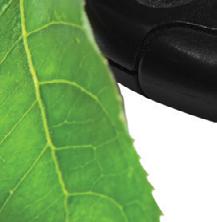
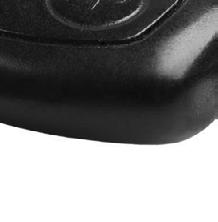
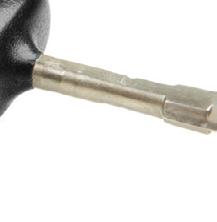








Agatha Christie wrote.
Wait, what? No Jessica Fletcher? Amid regally conquering the Broadway stage and Hollywood films, the luminous Angela Lansbury for 12 seasons, dominated Sunday evening TV with “Murder, She Wrote.” Her character was patterned after Agatha Christie’s astute sleuth, who also quietly earns confidences while uncovering secrets to expose killers.
No fan of murder mysteries, I can be excused that Hercule Poirot is not Jessica Fletcher, right? The Pioneer Theatre Company production is not what I imagined: “Jessica Fletcher’s Murder on the Orient Express, She Wrote.” Furthering my confusion, though Christie’s name begins the title, Ken Ludwig wrote the 2017 stage script — by request of the protective Agatha Christie Estate, it should be noted.
As the preeminent comic playwright, Ludwig is widely known for his clever turn-of-phrases and witticisms. His plays, including “Lend Me a Tenor,” “The Game’s Afoot,” and “Crazy for You,” are widely performed across the coun-
try and translated into as many as 16 languages. Appearing first as a paradox, Ludwig’s droll antics are seamlessly combined with Christie’s hefty drama.
PTC’s “Agatha Christie’s Murder on the Orient Express” is a comedic delight with vividly portrayed, memorable characters while closely following Christie’s intriguing murder mystery. The superb performances and skilled stagecraft elevate the production to stand alongside the company’s finest works.

The actors’ eclectic characters are distinct and diverse, originating from many parts of the world. Their backgrounds are as varied as their accents, skillfully guided by dialect coach ADRIANNE MOORE , a welcome addition to many Utah productions. JASON SIMMS ’ scenic design of a functioning railway coach is masterful, along with a beautifully draped, luxurious period-perfect wardrobe by the company’s resident costume designer PHILLIP R. LOWE . (In a dream world, my home’s closet would be suddenly complete by Lowe’s fine tailorings.)
It’s no coincidence that these characters happen to be traveling on the
same fabled trans-European express train with an unsuspected connection uniting the characters at the convoluted conclusion. That is the captivating twist Christie introduces.
Director Melissa RAIN ANDERSON establishes a delightful pace, never skipping a beat. Without ever allowing the silly to overtake the serious, it’s the only time we leave an Agatha Christie play with a wide smile.
JOHN TUFTS confidently portrays the world’s greatest detective Hercule Poirot. He superbly creates the wry center around which the extravagant characters revolve. Agatha would approve. Jessica, too.
EDWARD JUVIER , as Monsieur Bouc, is a knowing, understated sidekick to Poirot. ANNE TOLPEGIN chews scenery divinely as a meddling, snoopy American tourist, Helen Hubbard. As Russian princess Dragomiroff, BONNIE BLACK is a wonderful crotchety woman with oft-surprising lines.
The rest of the cast members are at the top of their game, getting into the ’30s spirit with elegance and a touch of screwball.
Climb aboard, theatergoers. Become enthralled passengers on Pioneer’s first-class Orient Express. It’s a wholly enjoyable excursion. Q
For more information on Pioneer Theatre’s “Agatha Christie’s Murder on the Orient Express,” see their website at pioneertheatre.org
PTCPHOTO:
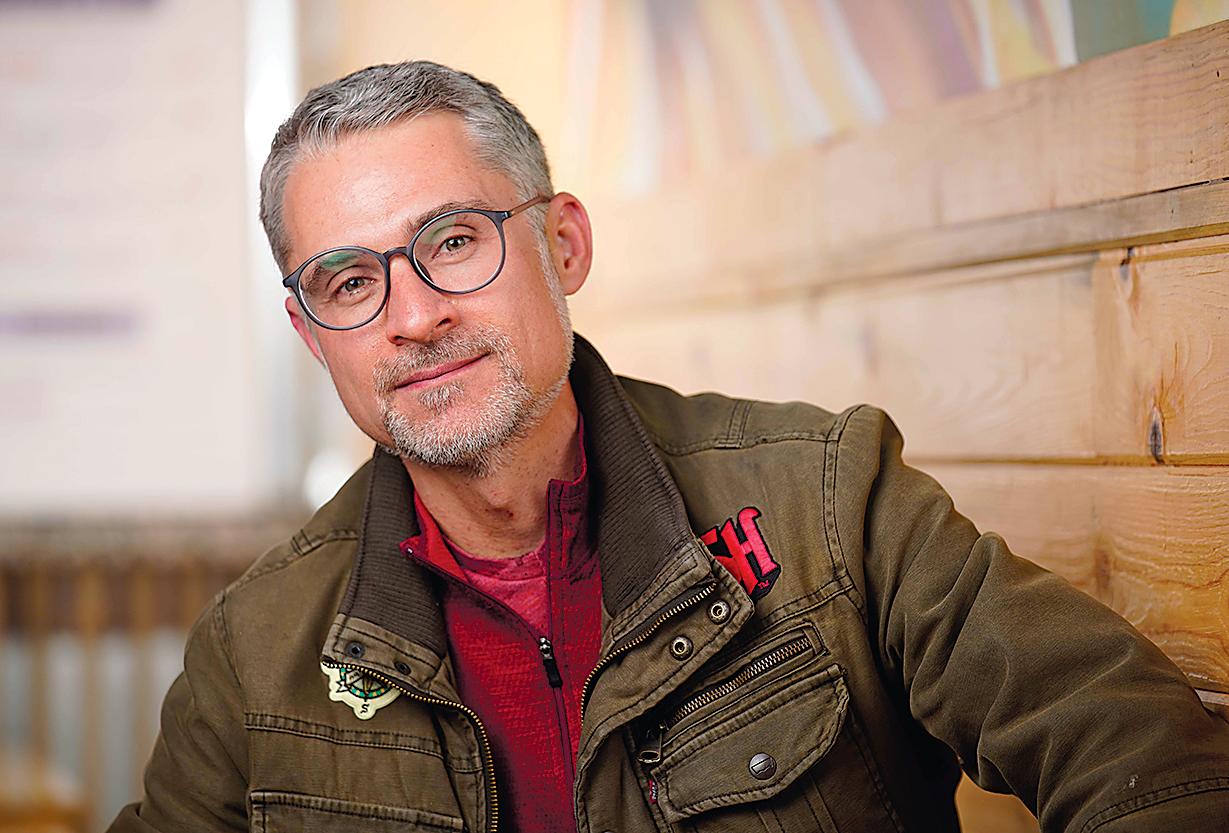 BY MATTHEW IVAN BENNETT
BY MATTHEW IVAN BENNETT
Sometimes, a piece of literature, or movie, or TV show, becomes so popular that its characters become people to us — no longer able to be owned, but in our minds as free and complex and malleable as real people. Occasionally, this happens with characters still under copyright, and creators (while they’re still creating) enter into a collective bargaining process with fans who want certain guarantees for their beloved. When it happens with characters in the public domain — like Holmes and Watson — a door suddenly opens into the multiverse.
Thus we have the dark comedy “Ms. Holmes & Ms. Watson — Apt. 2B” by Kate Hamill, or “Miss Holmes” by Christopher M. Walsh. Thus, do we have a forthcoming sequel in the Guy Ritchie action-adventure franchise in which Holmes and Watson, at least according to rumor, will be revealed as gay men. And, thus we have flame wars in online comment sections about Holmes “actually” being asexual. Along with cooler discussions on asexuality dot org.
Personally, I’m not moved by citations of the Doyle canon in support of this or that theory. I think the public domain is a public good, and “public” means anyone can do anything they want with the material. And they have. In a very real sense, Sherlock Holmes is gay. He is asexual. She is neurodivergent. They are anything we need the character to
embody in our fascination with the “cold, precise but admirably balanced mind.”

In my radio adaptation of “The Final Problem” for Plan-B Theatre and KUER’s RadioWest, John Watson has been changed to Dr. Joanna Brumby — though to Sherlock, she will always be “Watson.” On the run from Moriarty, Holmes and Watson reconnect after months of hardly seeing each other, and Holmes, far too late, tries to confess what he felt for her when she lived above him on Baker Street. Added to this, I take seriously the interpretations of Holmes as less than perfectly hetero. In this new version for Plan-B, Watson tries to confront Holmes about his sexual identity. And “Radio Hour Episode 17: Sherlock Holmes & The Final Problem” has the right plot for expressing these sides of Holmes and Watson, because unlike most of Doyle’s stories, “The Final Problem” is not a cozy mystery but a tragic thriller with Holmes (uncharacteristically) reflecting on his whole career and life. Incidentally, I wrote this radio play after having acted on radio for the first time in “Radio Hour Episode 16: The Case of the Missing Dog” by Brandan Ngo. So, my identity as a creator has
gotten a workout this year. In donning the headphones and learning how to position the mic — and learn new material overnight! — I ran through a door into a different universe. And life there was surprisingly hard. And surprisingly fun. The hardest part, on the day we went live, was the bubbling fear I was going to fumble my lines or laugh out loud on the radio. Luckily, neither happened. Though I was late for one of my cues as the dog.
But I hope you’ll join us at the Jeanne Wagner Theatre at the Rose Wagner Performing Arts Center as part of our ‘live studio audience’ for this installment of “Radio Hour.” A terrific honor in writing for the program has been fording the river of these classic characters and riding new currents — Dr. Frankenstein and the Monster, Alice in Wonderland, Snow White, Ichabod Crane, and now Sherlock Holmes and Dr. Joanna Brumby née Watson once again. Q
Playwright Matthew Ivan Bennett has written 13 of 17 episodes of “Radio Hour,” the annual co-production of Plan-B Theatre and RadioWest. Visit planbtheatre. org/sherlockholmes for details on and tickets to “Radio Hour Episode 17: Sherlock Holmes and The Final Problem” at 11 a.m. and 7 p.m. on Friday, October 27. You will be part of the live studio audience as both performances are also broadcast live on KUER.
‘Was Sherlock Holmes gay? What if Watson was a woman?’
 BY CHRIS AZZOPARDI
BY CHRIS AZZOPARDI
In this year’s Republican war against drag, the plot twist no one saw coming was that Flamy Grant, a contemporary Christian artist and drag queen, would top the Christian music charts. Now, that’s a feat for anyone, not to mention the first time any queen has accomplished this, but it’s the story of how Flamy got there that feels like the ultimate clapback in response to the anti-queer religious right. I say that as someone who was made to feel worthless as a gay kid by the Catholic church just for being who I am, but still felt a life-saving connection during those years to God through the warm and welcoming spiritual music of Christian icon Amy Grant, the inspiration for Matthew Blake’s “Flamy” persona.
Flamy’s rise this summer began when Christian nationalist preacher and far-right Jesus rocker Sean Feucht, who fought against The Walt Disney Company for its support of LGBTQ+ legis-
lation, taunted Flamy and her collaborator Derek Webb on Twitter. It was no surprise when Feucht, a Trump-supporting, anti-masking homophobe, took to social media to call out Flamy, remarking that her existence in Christian music was a sign of the “last days.”
Instead, it’s just the beginning of days for Flamy, as Feucht’s Twitter rant backfired when a heartening show of support for Flamy poured in — so much support that she topped the Christian charts on iTunes with both her No. 1 song “Good Day,” featuring Webb, and her No. 1 album “Bible Belt Baby,” her 2022 debut. Recently, the North Carolina native was featured in Rolling Stone, Billboard and Entertainment Weekly.
Flamy spoke to me recently about the pressure to suddenly step into the role of LGBTQ+ activist after her instant national exposure, healing her religious wounds with drag and how church looks very different for her these days.
After soaring to No. 1, you’ve been featured in national publications. How does this change course for what’s ahead for you career-wise? When I have a second to breathe, which, honestly, I haven’t had a ton of moments where I could just fully decompress and think about everything, and when I have those moments, it’s overwhelming. Especially those first couple of interviews that hit. Rolling Stone was one of the first ones, and I just lost my mind to see my face online on their website with a Rolling Stone logo right there. That was mind-blowing to me. Even being in Paste Magazine was just massive. Hopefully I will still be in Paste Magazine one day for my music and not some controversy started by a conservative worship leader.
But these are big, big moments and the moment’s not lost on me. I’m very much aware of how big a deal it is, especially where we are in 2023 in America, where trans folks and drag queens are really the target of so much legislation, so much online hate, so much in-person hate with these protests that are breaking out outside of our clubs and our safe spaces. And so the moment’s not lost on me — having a drag queen represented in a space that we typically think of as being for those folks who are against us. I get it. It’s a moment for me too. And I hope I’m doing a good job of representing. I can ultimately only represent myself, but I try to make sure that queer folks are spoken for right now in every conversation that I have, because it’s important. It’s important right now. Our lives are at stake.
You have inadvertently and very quickly stepped into an ac-








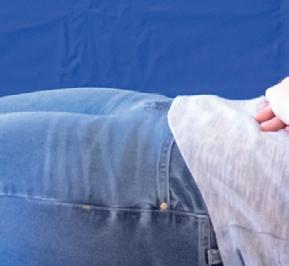
tivist role. What has that been like for you, and what kind of pressure are you feeling? Yeah, there’s definitely a pressure. I mean, I’m a three-and-a-halfyear-old queen. There are so many queens who would probably be so much more qualified than me to have these conversations, who’ve been doing it longer, who know the world better. But in those three-and-a-half years, I have fully immersed myself and I love drag so much. I love this art form. I hate that it took me 35 years of my life to finally get into it and try it and explore it. That was because I’m a late bloomer because of all that religious oppression. It took me so long to even just come out and then another decade to really unpack all of those inherited beliefs and find my freedom and find the love I have for myself today, that I definitely did not have in my 20s. So regardless of when and how it’s happening, I am glad that it’s happening at a time in my life when I feel more prepared to have these conversations and to speak from a place of love as opposed to a place of pain and hurt or aggression.
I understand the need to fight for our rights, and that is a longstanding tradition in the drag community and just in the queer community in general. We have had to fight hard battles. At the same time, I hope that I at least approach things with just a sense of love at the root and specifically, if nothing else, love for our community. My music, what I do in drag, first and foremost, it’s always for queer folks, and particularly it’s for queer folks who grew up in the church. That’s my primary audience. That’s who I’m thinking of when I write
songs, and it’s a secondary thing to me to speak to the church, to allies, to people who aren’t allies, and get our message across in that way. But first and foremost, drag is just a love letter to the queer community that saved me when the version of Christianity I grew up in couldn’t. How long did it take you to realize that drag was going to help you come to terms with your identity? I didn’t come out, fully out and proud, until I was 28. My 30s were really about unpacking all of the trauma and the damage done by a religious system that trained me from the beginning, and trained so many of us from the beginning of our lives, to believe that we’re worthless. We aren’t loved by God, like God can’t actually love us because we’re so sinful and so bad and fallen and all this doctrine and dogma that is just heaped on us.
As kids, we’re told how bad we are, and that is not good footing to start out life on. It’s terrible footing to start out life on, and so it takes a minute, at least it did for me, to dig out from under all of that. Lots of therapy, lots of good community and queer community, and having to remind myself and learn how loved and worthy I am. And that happiness is a thing that we get to experience here in this life. It’s not a thing we have to put on hold and hope that there’s a better thing waiting for us in heaven. Happiness is a thing we create for ourselves now, so that’s a lot of what my message is. But yeah, it can take a minute to undo all of that damage sometimes.
I grew up Catholic. It was intense. You grew up evangelical. Like you, I also did a lot of unpacking, a lot of therapy, a lot of Amy Grant. Those are the three levels: unpacking, therapy, Amy Grant. I wasn’t allowed to listen to anything growing up that wasn’t at our Christian bookstore. That was the music I was allowed to listen to. If I could buy it there, then I could listen, and Amy is the queen of Christian pop. I think that’s pretty undisputed. There’s not really been anybody else who’s had a career like hers, and especially at the time when I was growing up, “Heart in Motion” was just gangbusters, selling like crazy. So much of her music just imprinted
on me, and so even at the age of 37, when I was coming up with a drag name, that just made sense for me. I love the names that are wordplay on your favorite diva, like Tina Burner or Chaka Khanvict. Those kinds of things just tickle me. I love it. And so I wanted something in that realm. And when I said “Flamy Grant” out loud to my husband and he laughed — and my husband does not have all the religious trauma that I do — I was like, “Oh, if my husband can laugh at this, then I know there’s a whole generation of church youth group kids who are just going to be like, ‘Ah.’” And I wasn’t wrong. A lot of gay Amy Grant fans have been following her for many years, and for a lot of us who felt a lot of fear and shame within the church, her music just always felt like a safe place. And through that music, so did she. Absolutely. It’s kind of a universal experience that we have, especially as queer boys. We bond with a female icon. I think there was a subset of us who were growing up in the church and Amy was that person. She filled that role for us.
And I didn’t even know what queerness was until I was much older because I was so sheltered, but I knew I was different and I knew that there was, like you said, a safety in what Amy was doing, and I just loved her music so much. Memorized the albums front to back. She spoke to us in a way that it created safety and it created hope for what our future could look like. If you ever do meet Amy and get a chance to perform with her on the same stage, what’s a song of hers that you clung to as a kid that you would want to perform with her? Let’s pick a whole album. My favorite Amy album is “Behind the Eyes.” It spoke to me at a really specific time, because I was in high school when that one came out, and it was the first time I heard a recording by a Christian artist where it just let me sit in some of the sadness and some of the pain. The song was there to facilitate a space for pain because so much Christian music is like, “Well, we can acknowledge that life is hard in the first verse and in the second verse, but by the time that bridge rolls around, honey, you’d better wrap it up and point it back to Jesus and say, ‘Jesus healed me and saved everything, and it’s all good now.’” That is Christian music,

and I had never really heard a song like “The Feeling I Had.” I love that song so much, and it was about a painful marital relationship. She was going through her divorce at the time, and that didn’t necessarily speak to me as a high schooler, but it made space for me. I was like, “Oh my gosh, I can just process pain without having to smear on a plastic smile afterwards, and pretend like everything’s OK. We don’t always have to be OK.” That’s what that record did for me. Another song I would love to do with her is “You’re Not Alone” from “Heart In Motion.” That song to me, actually, is an anthem for the ex-evangelicals, the people who’ve left the deconstruction movement. It’s such a powerful lyric, actually, for me when I hear it in that context, or think about it in that context, that you’re not alone.
Are you still involved with the church? Well, I’m not involved with a local church anymore. I don’t have a home church now.
My church that I served at for the past eight-and-a-half years as one of the worship leaders was awesome. Very progressive, affirming, inclusive, all the things, but it closed down last year. It was kind of a casualty of the pandemic. So for me, it’s actually been a wonderful transition. It’s the first time in my life I have not had a church service to put on on Sunday mornings. I’ve always been involved in the making of church from high school… well, even younger, honestly. And I’m loving it. I love gay brunch on Sunday,
and I am not ready to give that up anytime soon.






I mean, let’s be real. That is church for some. It is church, absolutely. And I gave the first half of my life, literally 40 years, to the church and not just as an attender. I’ve been on church staffs at megachurches, I’ve been a church planter, and I’ve mostly just been a worship leader since high school, and that’s plenty. I’ve given plenty, and now it’s time for me to do something else, and it seems like the thing I’m going to be doing is singing songs in drag. It seems like you’re in a place now where you’ve worked through it yourself and now you can help other people do the same. I think that’s my hope. I hope that my music does that for some folks, and I hope that even the queer kids who are being sheltered the way I was and kind of isolated from the world, I still found ways to find things that my heart and my soul were hungry for. And so a drag queen’s not going to speak to every queer kid, but for some of the kids, she will, right? There are kids out there who are going to see what I’m doing and they’re going to be like, “Oh, that speaks to me. That gives me hope for a future that could be mine one day.” Q This interview has been lightly edited and condensed for clarity. Chris Azzopardi is the Editorial Director of Pride Source Media Group and Q Syndicate. He has interviewed a multitude of superstars, including Cher, Meryl Streep, Mariah Carey and Beyoncé. His work has also appeared in The New York Times, Vanity Fair, GQ and Billboard. Reach him via Twitter @chrisazzopardi.




Vehicle donations are fully tax-deductible and the proceeds help provide services to help the blind and visually impaired.

• Every donated vehicle will be properly recycled, reducing waste and harmful emissions.


















The pop performer was brazen on her Summer Carnival Tour, but not just when she was in the air
 BY CHRIS AZZOPARDI
BY CHRIS AZZOPARDI
Iwatched in gasping awe on Aug. 16 as Pink spun through the cool Detroit air, a soaring trapeze artist with a soaring voice to match. Take, for instance, the way she zipped to all corners of Co-merica Park during her Summer Carnival Tour, her first-ever stadium show in Detroit, while somehow still singing her playfully cocky hit “So What” against the city’s skyline. That acrobatic entrance alone definitely earned her the glass of wine and bubble bath she took shortly after-wards, according to her post-show Instagram post.
Twenty-plus years into an enduring career built on reinvention — something to admire, especially when you consider Pink’s underdog status in the era of Britney and Christina — the singer-acrobat has become known for this circus act. It wasn’t until her second album that she dropped the R&B persona that defined her 2000 debut “Can’t Take Me Home” and went full on pop-rock. Though her path seemed clearer based on that album’s success, its followup in 2003, “Try This,” was a commercial flop. During that time, when
she first made being a misfit look cool, who could have predicted that it would be Pink selling out stadiums across the country in 2023? Not to mention, breaking a Comerica Park record — her sellout crowd of 45,000-plus is now the biggest reserved-seat attendance in the ballpark’s 23-year history, besting acts such as the Rolling Stones, Billy Joel and Elton John.
The first time I saw Pink was in Detroit at the State Theatre in 2002 for the Party Tour. There were no “holy shit, she’s flying” moments; she was on foot the whole time. Still I knew she had something even more daring than a circus act to give this fickle world — that’s real talk, no mat-ter the consequences.
A few years later, in 2006, Pink released “Dear Mr. President,” a joint effort with the Indigo Girls. The song, where she called out those opposing same-sex marriage, was coincidentally re-leased the same year the Chicks released “Not Ready to Make Nice,” a song the country trio di-rected at those who blackballed them after speaking their mind about then-President George W. Bush. Pink didn’t let what
happened to the Chicks stop her, however. In Pink’s song, she blasted Bush with her signature no-bullshit approach. I was already paying close attention to her as a fan of her music and a teenage misfit myself, but it was that show of direct allyship, a gesture she made as a relatively new artist at what seemed like peak fame, that gave me newfound respect for her.
Years later, she’s still peaking. And her platform has changed — it is, fortunately, even bigger now. It is stadiums in Nashville, Cincinnati, Omaha — all places where anti-LGBTQ+ legislation has passed in the last year — and Detroit, where I realized no one seems to be talking about the other gusty part of her Summer Carnival Tour.
No, she’s not swinging from the top of a stadium, but Laura Ann Carleton, a mother of nine, was fatally shot in California recently, allegedly killed by a 22-year-old because of the Pride flag she proudly put in her store window. In 2023, it’s dangerous to even be an LGBTQ+ ally. So as I watched a sold-out crowd of 45,000 people, surely some of them Trump supporters and others who may
be oblivious to the threat of simply being LGBTQ+ or even an ally right now, I was also seeing Pink the pro-queer advocate — someone who has not backed down from the fight for equality, even as she commands her most massive audiences yet.
At Comerica Park that night, any anti-queer fans had to confront the reality of pervasive homo-phobia and racism in our country, not to mention the overturning of Roe v. Wade and gun vio-lence. The flying was a thrill to watch, but these days it seemingly takes even more guts to stand up for basic human rights. Pink did just that several times during her show in Detroit, performing her politically charged protest song “Irrelevant,” written and released last year. On giant screens were protest images from #MeToo, Pride and Black Lives Matter marches, many of which appear in the song’s music video. One said “Queer solidarity.” Many of the clips shown had rainbow flags, the same cheerful, defiant imagery that got Carleton killed.
I looked around plenty at the show to understand the crowd, and I couldn’t come up with many examples of pop performers who appeal to such a broad spectrum of

people like Pink does, from gay men to lesbians to some sloppy-drunk small-town suburban moms and their husbands — the same ones who don’t think trans people should be able to pee wherever they choose. Well, not only did they get Pink’s 2017 anthem “What About Us,” a message to Trump on how to be a president for all people, but those husbands also got Brandi Carlile, an out lesbian and multi-Grammy winner who is also an unapologetically vocal LGBTQ+ activist.
I love this circus act because only Pink can do it, I have never seen anything like it in the pop mu-sic world, and it gets people who might not otherwise listen to how minority communities are hurting to perk up their ears. But also, Pink is onto something by marrying the wide appeal of a carnival act with her more polarizing political views — through the art of flying, she’s made it impossible for anyone to look away. Q
Chris Azzopardi is the editorial director of Pride Source Media Group and Q Syndicate. He has interviewed a multitude of superstars, including Cher, Meryl Streep, Mariah Carey and Beyoncé. His work has also appeared in The New York Times, Vanity Fair, GQ and Billboard. Reach him via Twitter @chrisazzopardi.
When you help care for a loved one, you take care of ever y thing . But are you taking care of yourself?
AARP can help with information and useful tips on how you can maintain a healthy life balance, care for your own physical and mental well-being, and manage the challenges of caring for a loved one. Because the bet ter care you take of yourself, the bet ter care you can provide for your loved one.
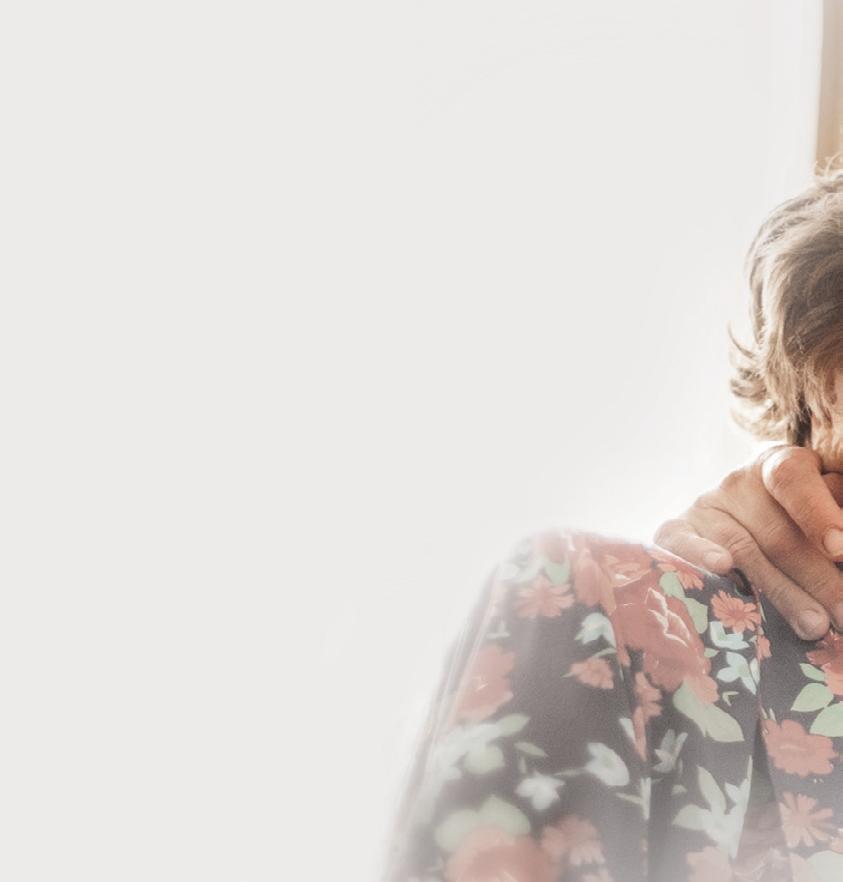
You’re there for them. We’re here for you.

Find free Care Guides to suppor t you and your loved one at AARP.org /caregiving




BUZZED DRIVING IS DRUNK DRIVING
 BY JIM FIELDING. © 2023 WILEY, $28, 213 PAGES
BY JIM FIELDING. © 2023 WILEY, $28, 213 PAGES
Born in Toledo into a big extended clan, Jim Fielding says that it looked like he was a member of “the perfect, nuclear family.” The truth was, though, that “vulnerabilities and dysfunctions were numerous,” and that included homophobia, which was a problem: when he was six years old, Field-
ARIES March 20—April 19
Try being something else for a change to get a different perspective. Walking in the shoes or clothes of others is a good way to find creative ways to relate. Don’t work too hard on friendships that aren’t bringing joy. Focus on connections.
TAURUS Apr 20—May 20
Nature is a force you are willing to deal with, but only if there are some healing benefits in the mix. The world is seeming a little small lately, so getting out and seeing more of it will help broaden the horizons. Keep the joy flowing and going.
GEMINI May 21—June 20
Whatever you’re going through is only temporary, even if it’s been going on for a while. The past has a way
ing realized he was Gay.
To cover for it, he became an overachiever but with a lack of self-confidence and an abundance of insecurities. To help him conquer his weaknesses, he built a great support system, but still, he says, “I wish I had a book like this when I was starting out in my career.”
His first point here is his mantra: “Control the controllable, but leave space for the possible.”
Other advice he’s learned: Color “within the lines” if you must, but do it at “a company whose ethics and values align with your own.” Remember that if the job is right, you won’t have to change who you fundamentally are.
What else? If you’re in control, set clear goals, “hire people who are smarter than you are,” and get to know
of lingering like a foul stench. Shower yourself with love and acceptance. A friend could be more helpful in this than believed.
CANCER June 21—July 22
With everything happening in your social circles, you may have neglected to care for yourself. Take comfort in the smaller pleasures, and don’t give up on being neat and tidy. The control you gain will aid in overcoming the darkness.
LEO July 23—August 22
A moment of silence will be necessary in a loud place. Seek answers from within to bathe in inner peace. Parties and festivities are common, and while it might be tempting to be in charge, taking a backseat may be preferred.
VIRGO August 23—Sep 2
A lot of changes mean confusion in the world you inhabit. It’s okay, nothing is going to break unless you push it too hard. Check in on your friends, get finances in order, and
them well. Strive always for “cultures of excellence.” Trust your intuition, tamp down impulsiveness, but be flexible — which will help you attract and keep the best team possible.
Also: “Never stop learning.” Accept that you can forgive without forgetting transgressions. Learn to “define family however it works for you…”
Plus: Know the difference between want and need. Know that selfishness is a righteous thing sometimes.
And always “leave [your] corner of the world a better place than [you] found it”: donate, volunteer, do good.
In his preface, Fielding says that he wrote this book because he “realized that my leadership style and success… are completely dependent on my personal journey.” Those words should alert readers that All Pride, No Ego is
find new ways of doing the old tasks. Change is a good thing.
LIBRA Sept 23—October 22
Whether this is your favorite season or not, there’s no denying that you feel good right now. Indulge in the cool nights and warm gatherings. Truth is not about knowing what is real, but understanding what is right for you. Relax!
SCORPIO Oct 23—Nov 21
It might seem challenging to get past an old beef. Rest assured, it’s easier to get over it. Focus more on love and connections and less on what makes the world go round. Have a party or gathering, or get dressed and go out.
SAGITTARIUS
Nov 22—December 20
Don’t go looking for trouble, but get yourself into a little from time to time. It’s good to let your hair down. A family matter is puzzling at best, but letting go will allow the wrinkles to work out naturally. A big surprise is coming.
predominantly a memoir, which isn’t a bad thing, but it bears mentioning.
If you don’t have the patience it takes for rambling stories, you won’t like this book at all, in fact. Fielding is a storyteller, and he smartly uses his experiences to show, not tell, in a way that’s pleasant and relatable for anyone who’s ever struggled at work. Yes, the workplace tales mean that business advice is sometimes embedded, sometimes apparent, and sometimes down a rabbit hole for you to follow, but for most readers, it’ll be a useful scavenger hunt.
While this book is perhaps best for the person who’s looking for a first job or who just found one and is sweating to fit in, All Pride, No Ego is worthwhile for anyone. Q
CAPRICORN
Dec 21—Jan 19
Pressure may be on to get a new career, but your creative side is calling. It is best to answer it. Seek a new method of expression and allow the world to see who you are. Those close to you may be scared but fascinated, too.
AQUARIUS Jan 20—Feb 18
No one is in your way, but it might seem like it. Look both ways before crossing into unexplored territory and get a move on when no one is there. A likely source of income is bound to help in a tough time. Be yourself and do good work.
PISCES Feb 19—Mar 19
Gifts are bound to fall into your lap, and delights will seek you out. There is nothing wrong with having some unplanned adventures, but keep an eye on your watch. Time has a way of getting away from you. Even so, it’s okay to play.
Apopular social community group is celebrating 20 years at a spicy dinner to be held on October 21. Bring in the cake and cue the live music.
Those attending should bring food to share.
“It doesn’t matter if it is hors d’oeuvres, a main dish, a salad, a dessert, or drinks;
we suggest servings for at least eight people. While we encourage you to prepare the dish yourself, it’s fine to bring something from a store, restaurant, or bakery,” said Allen Miller, one of the dinner coordinators. “All Spicy Dinners are BYOB. If you bring a bottle that is only for your use, be sure to keep it by your side.”
“Because Spicy Dinner is a potluck affair, the variety of victuals is
amazing. The dishes typically range from gourmet to down-home, from spicy to mild, from hand-made to store-bought,” Miller continued.
A little friendly competition is also on the menu.
“Judges select the best home-cooked main dish, side dish, and dessert; and prizes are awarded in each category,” Miller said.
“Spicy Dinners are for gay, trans, and bisexual men who live, work, or play on Utah’s Wasatch Front. It is intended to help male-identifying individuals in our community have an opportunity to meet, make friends, and socialize with one another in a non-threatening, non-sexual environment.”

“Spicy Dinner is often the first stop for guys who are moving out of the closet and need support transitioning. It is also welcoming for guys new to Utah.”
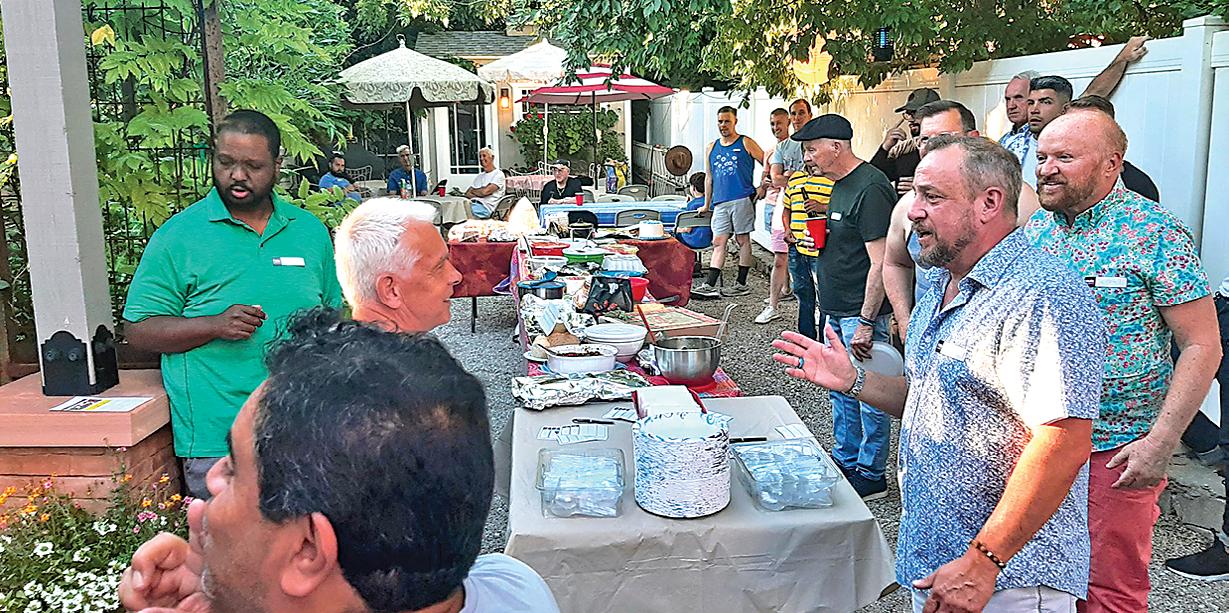
Dinners are held on the third Saturday evening of each month (except December) in private homes in the Salt Lake area. Friends and relatives of the male-identifying community are also welcome.
“We are the friendly people, eager
to meet newcomers and have fun,” Miller noted.

Spicy Dinners got started in October 2003 as a lunch break during the Salt Lake City Gay Men’s Health Summit. Informal pot-luck dinners grew to an organization of 350 members by 2008.
“The thing we had in common was that we all liked spicy food, so that was how the name evolved,” said Logan Brueck for the Fifth Anniversary Dinner in 2008. Brueck was an original member and longtime dinner coordinator for the monthly event.
Currently, the dinners have 790 followers on Facebook. Between 75 and 125 typically attend monthly dinners, with 6 to 10 newcomers each month.
Why the longevity of this monthly gathering?

Miller attributes it to many longstanding members who
regularly attend (he and his husband Eleandro have been coordinators for ten years). Also, the dinners showcase unique and historic homes, as well as being ”The Place to be social with a broad range of the community.”
“We want to be a resource to members of our community who are looking for new friends and companions for living life to the fullest. Spicy Dinner attendees often meet like-minded individuals with whom they can travel, read books, play sports, attend plays and concerts, and have a fun life together,” Miller said. “While Spicy Dinner is NOT a hook-up group, more than a few romances have had their start at Spicy Dinner.” Q
The organization has a Facebook group at fb.me/SaltLakeSpicyDinner. If a person desires to receive an email about each month’s dinner, he needs to forward his name, mobile number, and email address to: SpicyDinnerSLC@gmail.com.


1 With mouth wide open
5 Steven Greenberg, for example
10 One of the Three Bears
14 Gay nightlife district of London
15 Hard woody nut?
16 Role for Bela
17 10-year-old’s comment at the National Book Festival to 60-Across
19 Get juice from a fruit
20 Daily that features pics of zippers?
21 A dick investigates them
23 Saucer pilots
24 Video game name
25 Word from Tom Bianchi, perhaps
28 Start of the reply from 60-Across
33 Abe Lincoln’s boy
34 They have a top job
36 Take care of the bill
37 Gay.com and others
39 More of the reply
40 Robin Williams’ home, in “Aladdin”
41 No, in Moscow
42 “East of ___”
43 Cole Porter title city
44 Would-be master’s test
46 Order from Stewart’s Picard
48 End of the reply
52 Word after ass
53 Touches up
55 Came quickly
59 In case
60 Transgender thespian
62 Lake of Ohio ferries
63 “Faboo!”
64 Digital-rectal, for example
65 Big Apple enforcement org.
66 Montreal team of old
67 Lorca’s boy DOWN
1 “Yeah, right!”
2 Score in “Bend It Like Beckham”
3 Cry of Dorothy
4 Reading for Rev. Troy Perry
5 Sounds like Fierstein
6 Dull discomfort
7 Crude homophobic dude, for example
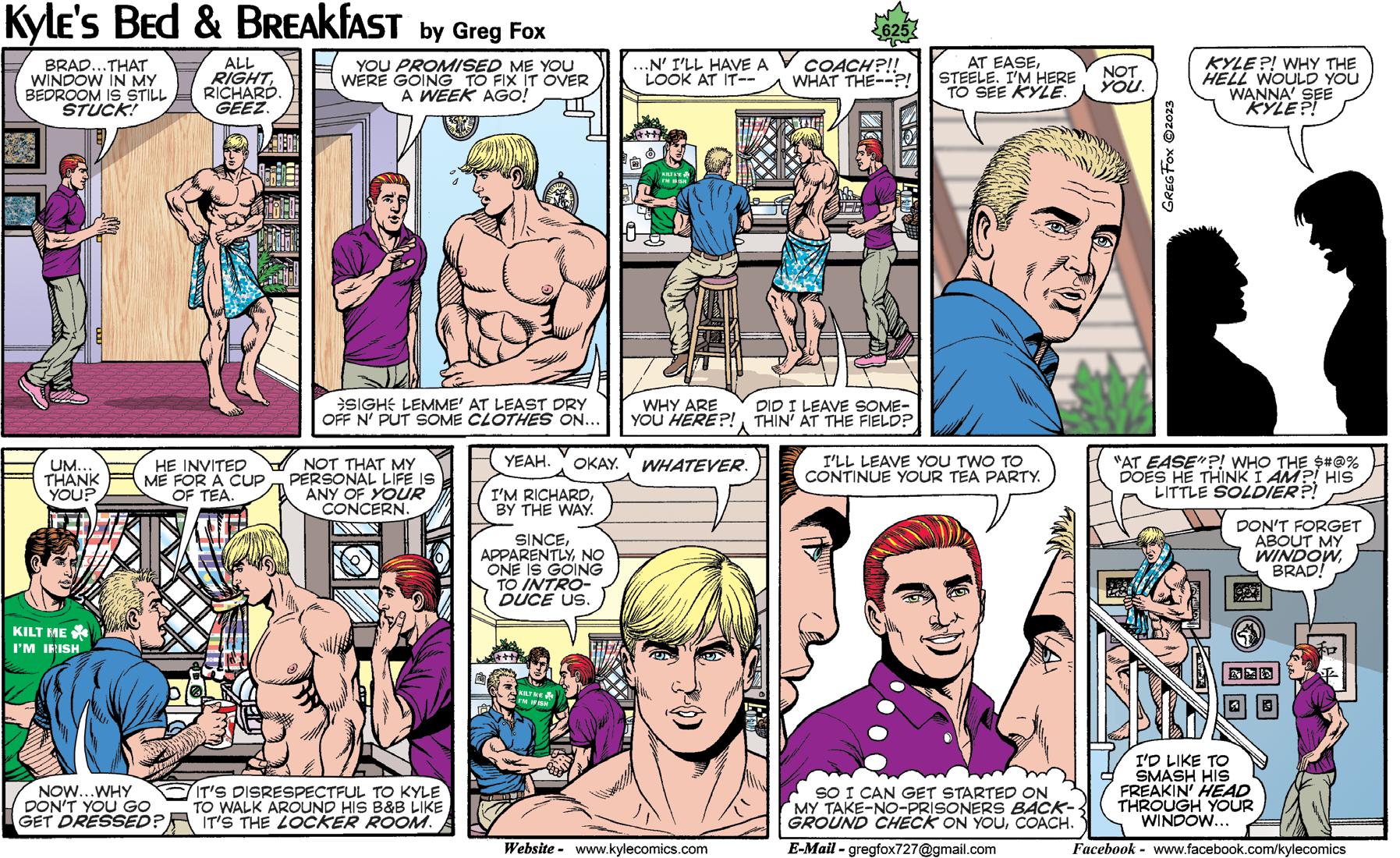
8 Cold response
9 On paper
10 Load
11 Is unlike Dorian Gray
12 Zoo barrier
13 Octopus abundance
18 Rock Hudson’s “Gun Fury,” for one
22 The I’s have ‘em
24 Near the breastbone
25 Reveal one’s orientation, perhaps
26 Madonna, in a creche
27 Lethargic words from Ted Casablanca?
28 “I’m not in the ___!”
29 Stephanie’s actor-dad
30 Eyeball benders
31 Tom, Dick, and Harry
32 It’s not a mistake at the Red Cross
35 Give a chit
38 Walked in a cocky way
40 Exposed and vulnerable
43 Presidential candidate of the ‘90s
45 War zone, in brief
47 They buzz when you blow them
48 “The Wizard of Oz” scorer Harold
49 Like the aroma of some gay bars
50 “Love Affair” costar Dunne
51 Old message sender
54 Smack on the backside, e.g.
56 Ankle-length skirt
57 Richard of “A Summer Place”
58 Barney Frank, in brief
61 Simpson case judge
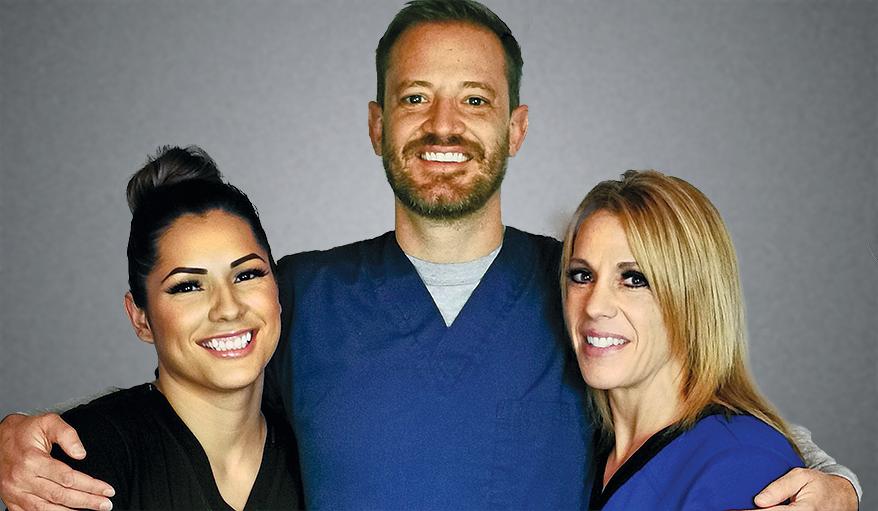

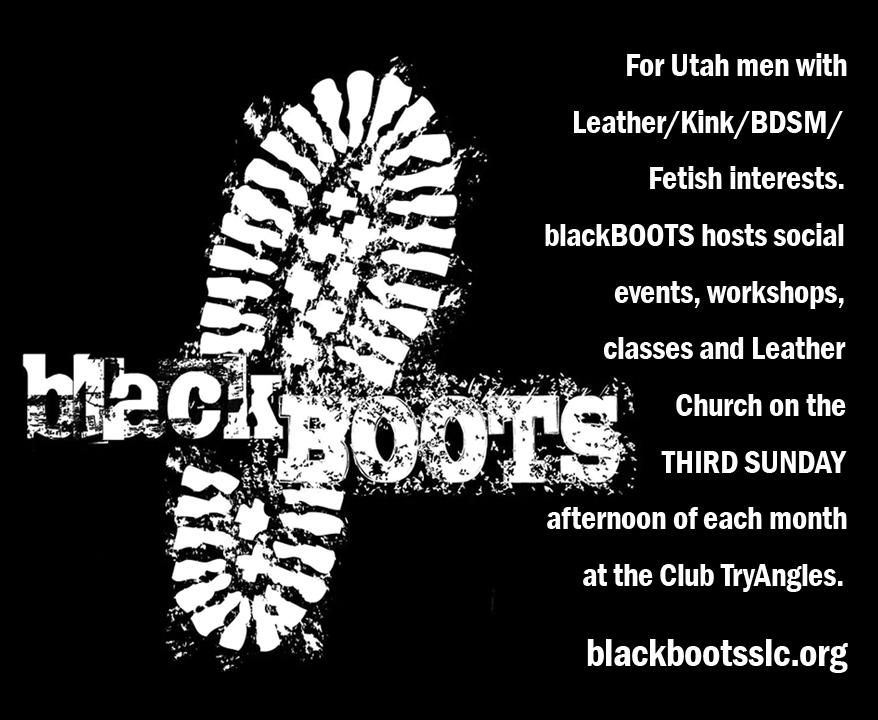


BUSINESS
LGBTQ+ Affirmative Therapists Guild
lgbtqtherapists.com
* jim@lgbtqtherapists.com
Utah LGBTQ+ Chamber of Commerce
utahlgbtqchamber.com
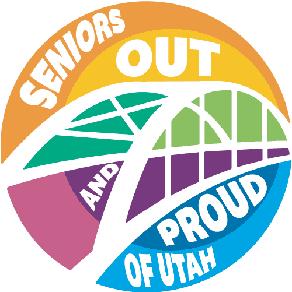
* info@utahgaychamber.com
Utah Independent Business Coalition
utahindependentbusiness.org
801-879-4928
DOMESTIC VIOLENCE
National Domestic Violence Hotline
1-800-799-7233
YWCA of Salt Lake
ywca.org/saltlakecity
322 E 300 S
801-537-8600
HEALTH & HIV
Planned Parenthood
bit.ly/ppauslchiv
654 S 900 E
801-322-5571
Salt Lake County Health
Dept HIV/STD Clinic
610 S 200 E, 2nd Floor
Walk-ins M—F 8a—5p Appts 385-468-4242
UAF Legacy Health
utahaids.org
150 S 1000 E
801-487-2323
Weber-Morgan Health
Mon., Weds 1-4:30p
477 23rd St, Ogden Appt 801-399-7250
HOMELESS SVCS
VOA Homeless Youth
Resource Ctr, ages
15—21
880 S 400 W
801-364-0744
LEGAL
Rainbow Law Free Clinic
2nd Weds 6—7:30pm
Utah Pride Ctr
probono@law.utah.edu
POLITICAL Equality Utah
equalityutah.org
* info@equalityutah.org
376 E 400 S
801-355-3479
Utah Libertarian Party
129 E 13800 S #B2-364 libertarianutah.org
866-511-UTLP
Utah Stonewall Democrats
utahstonewalldemocrats.org
fb.me/ utahstonewalldems
RELIGIOUS
First Baptist Church
firstbaptist-slc.org
11a Sundays 777 S 1300 E
801-582-4921
Mt. Tabor Lutheran Church
10:30a Sunday worship
175 S 700 E 801-328-0521
mttaborslc.org
Sacred Light of Christ
slcchurch.org
823 S 600 E 801-595-0052
11a Sundays
SOCIAL
Alternative Garden Club
utahagc.org/clubs/ altgardenclub/
1 to 5 Club (bisexual)
facebook.com/ groups/1to5clubutah
blackBOARD
Men’s Kink/Sex/BDSM education, 1st, 3rd Mons.
blackbootsslc.org
blackBOOTS Kink/BDSM
Men’s leather/kink/ fetish/BDSM 4th Sats.
blackbootsslc.org
OWLS of Utah (Older, Wiser, Lesbian Sisters)
bit.ly/owlsutah
qVinum Wine Tasting
qvinum.com
Seniors Out and Proud
fb.me/soaputah
* info@soaputah.org
801-856-4255
Temple Squares Square Dance Club
templesquares.org
801-449-1293
Utah Bears
utahbears.com
fb.me/utahbears
* info@utahbears.com
6p Weds SL Coffee
Break, 430 E 400 S
Utah Male Naturists
umen.org
fb.me/utahmalenaturists
* info@umen.org
Utah Pride Center
utahpridecenter.org
* info@utahpridecenter.org
1380 S Main St
801-539-8800
Venture OUT Utah
bit.ly/GetOutsideUtah
SPORTS
QUAC — Queer Utah
Aquatic Club
quacquac.org
* questions@ quacquac.org
Salt Lake Goodtime
Bowling League
bit.ly/slgoodtime
Stonewall Sports SLC
fb.me/SLCStonewall
stonewallsaltlakecity. leagueapps.com
385-243-1828
Utah Gay Football League
fb.me/UtahGayFootballLeague
Venture Out Utah
facebook.com/groups/ Venture.OUT.Utah
SUPPORT
Alcoholics Anonymous
801-484-7871
utahaa.org
LGBT meetings: Sun. 3p Acceptance Group, All Saints Episcopal Church, 1710 Foothill Dr
Tues. 7p Live & Let Live, Mt Tabor

Lutheran, 175 S 700 E Wed. 7p Sober Today, 1159 30th St , Ogden
Wed. 7p Bountiful
Men’s Group, Am. Baptist Btfl Church, 1915 Orchard Dr, Btfl
Fri. 7p Stonewall Group, Mt Tabor
Lutheran, 175 S 700 E
Crystal Meth Anon
crystalmeth.org
USARA, 180 E 2100 S
Clean, Sober & Proud
Sun. 1:30pm
Leather Fetish & Kink
Fri. 8:30pm
Genderbands
genderbands.org
fb.me/genderbands
LifeRing Secular Recovery
801-608-8146
liferingutah.org
Weds. 7pm, How was your week? First Baptist Church, 777 S 1300 E
Sat. 11am, How was your week? First Baptist Church, 777 S 1300 E
LGBTQ+ Affirmative Therapists Guild
lgbtqtherapists.com
* robin@lgbtqtherapists.com
YOUTH/COLLEGE
Encircle LGBTQ Family and Youth Resource Ctr
encircletogether.org
fb.me/encircletogether
91 W 200 S, Provo, 190 S 100 E, St. George 331 S 600 E, SLC
Gay-Straight Alliance Network
gsanetwork.org
OUT Foundation BYU
theout.foundation
fb.me/theOUTfoundation
Salt Lake Community College LGBTQ+
slcc.edu/lgbtq/
University of Utah LGBT Resource Center
lgbt.utah.edu
200 S Central Campus
Dr Rm 409, M-F, 8a-5p 801-587-7973
USGA at BYU
usgabyu.com
fb.me/UsgaAtByu
Utah State Univ.
Inclusion Ctr
usu.edu/inclusion/
Utah Valley Univ Spectrum
linktr.ee/spectrumqsa
uvu.edu/lgbtq/
* lgbt@uvu.edu
801-863-8885
Liberal Arts, Rm 126
Weber State University
LGBT Resource Center
weber.edu/
lgbtresourcecenter
Shepherd Union Suite 323 Dept. 2117
801-626-7271
Westminster Student Diversity Center
Bassis 105, M-F 8a-5p
bit.ly/westdiversity
Our Vision is to reduce social isolation and loneliness, improve the health and well-being of older adults and to empower them to lead meaningful and connected lives in which they are engaged and participating in the community.
Our Mission is to reimagine aging by empowering older adults to live life to the fullest potential guided by these five pillars:
• Cherish the Journey
• Encourage the Body
Recent events: Snowshoeing, Bingo, Valentines Pot Luck & Dance, Movie Night, Walking Groups, Theater groups
• Inspire the Mind
• Nurture the Spirit
• Empower the Future
Find us at SeniorsOutAndProudUtah.org and Facebook.com/SOAPUtah
Weekly drop-ins and activity nights held at the Utah Pride Center, 1380 S Main St. Some require registration at utahpridecenter.org/ programs/
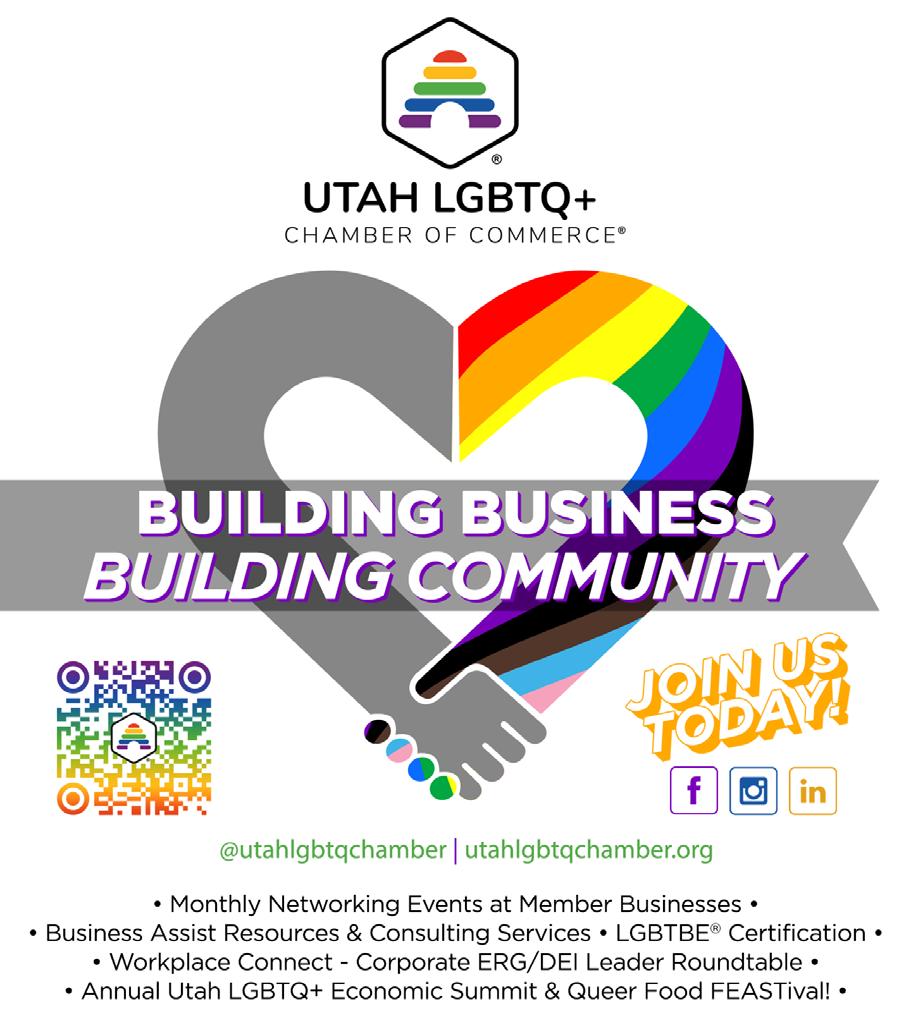
ADULT & SENIOR
Silver Pride Senior (50+) Mon 2—4 pm, in-person.
Neurodivergent
Support & Social Club, Mon 6—7 pm, In-person & virtual Bi+Pan Support & Social Club, Mon 6:30—7:30 pm, In-person & virtual registration req’d Trivia Night (21+ Mon 7:30—9 pm, in-person (no more than 6/team).
Health Insurance
Help From Take Care Utah, Tue 3—5 pm, in-person, 18+.
Gay Men’s Peer Support Group, Tue 6:30—8 pm, in-person, 18+ * billblevins@ hotmail.com

Pride in Recovery, 18+ Tue 7—8 pm, in-person
Gay Men’s Sack Lunch, Wed, Noon—1 pm, in-person, any gay male-identifying humans 18+.
Women’s Support Group, Wed, 6—7 pm, in-person & virtual, registration req’d
LezBee Honest Support & Social Club, Wed, 7—8 pm, In-person & virtual, registration req’d
Trans/Nonbinary Support Group, Thurs 6—7:30 pm, In-person & virtual, registration req’d
Queer People Of Color Support & Social Club, Thurs, 6:30—7:30 pm, In-person & virtual, registration req’d
Parents & Caregivers
Support Group, Thurs 6:30—7:30 pm, In-person & virtual, registration req’d Game Night, 18+ Fri 5:30—9 pm, in-person, Families Like Ours, Sun 3:30—5:30pm, in-person
YOUTH & FAMILY
PROGAMS
Youth 10—13 Support Group, Tue 5—6pm pm, registration req’d Youth 10—13 Activity Night, Thu 5—6 pm, registration req’d Youth 10—13 Free
Time Hours, Tue/Thu 3—8 pm, reg. req’d Teens 14—17 Support Group, Mon 5—6 pm, registration req’d Teens 14—17 Activity Night Wed 5—6 pm, registration req’d Teen 14—17 Free Time Hours, Mon/ Wed 3—8 pm, registration req’d


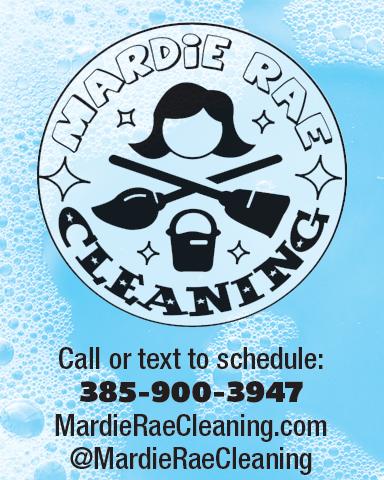


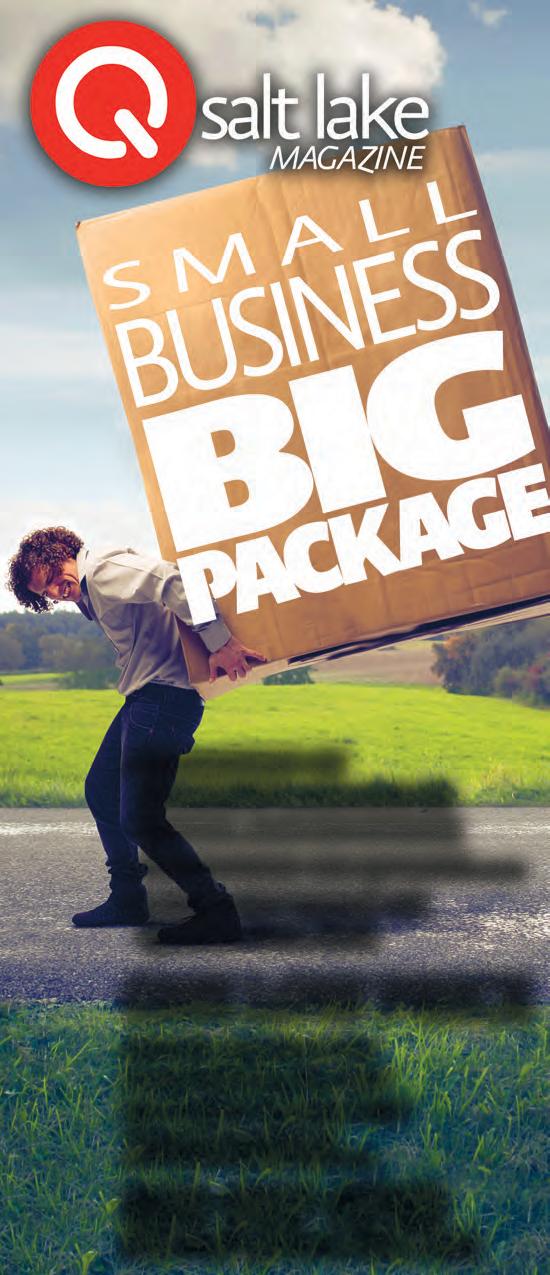

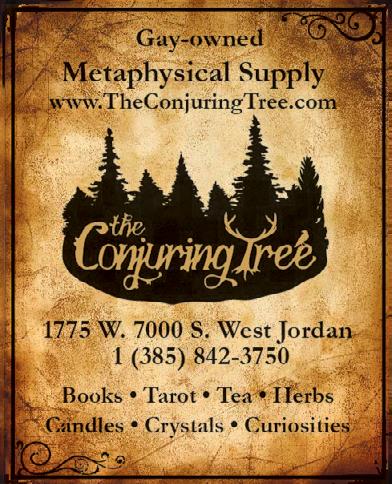









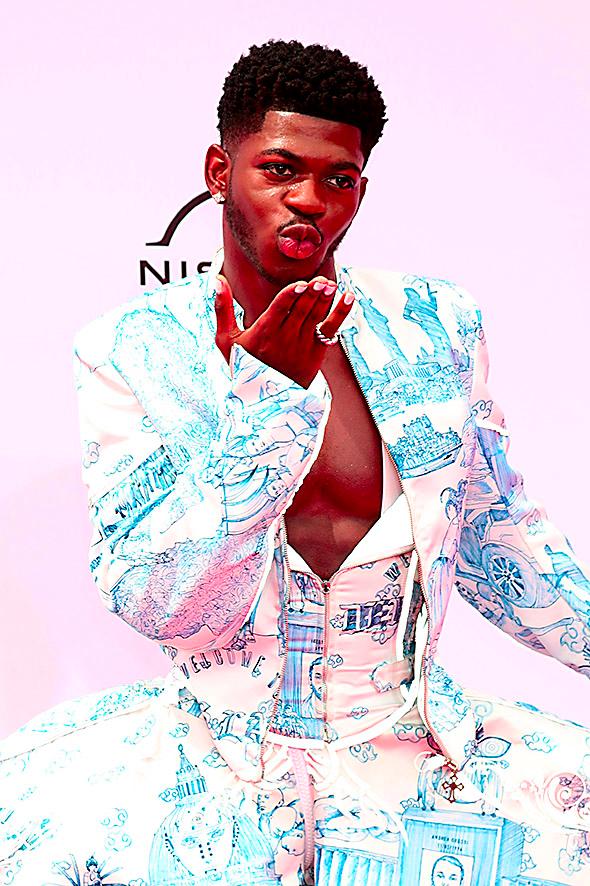
The Toronto International Film Festival is about to get an in-depth look at the world of Montero Hill, aka Lil Nas X, with the Grammy Award-winning rapper, singer and songwriter’s documentary, “Lil Nas X: Long Live Montero.” Shot over the course of his first tour, the cameras follow him in a diaristic portrait as he navigates the business, the music, the fans, his family, and his place in the history of queer Black artists. Directed by Carlos López Estrada (“Blindspotting,” “Raya and the Last Dragon”) and Zac Manuel (the Sundance Film Festival Jury Award Winner – Best Non-Fiction Film: “Time, Alone”). Since scoring the longest-running No. 1 single in Billboard Hot 100 history in 2019 with “Old Town Road,” Lil Nas X has come out as queer and lived it all out loud despite opposition from anti-LGBTQ forces in the culture and within the music industry. And with scores of other pop artists working the documentary angle during the course of their career trajectories, this film is going to be a welcome addition to the canon of queer artists telling their own stories in their own way. We’re not sure where this film will land after the festival — theaters or streaming or both — but keep your eyes and ears open.
Ariana DeBose has a lot going on
Welcome to your Ariana DeBose career achievement checklist. The Academy Award-winning queer powerhouse has, let’s say, some (OK, a lot of) projects in the pipeline. Last year we reported that she’d be taking on an unspecified role in the upcoming Marvel film, “Kraven the Hunter,” but now we know that she’s playing the priest Calypso, opposite Aaron Taylor-Johnson’s Kraven, and that the film is slated for a late summer 2024 theatrical bow. She’s also still involved in the Blumhouse horror “House of Spoils,” opposite queer former “Euphoria” star Barbie Ferreira (but still no drop date for that one). And while you’re waiting, she’ll voice the lead role of Princess Asha in the coming-soon Disney animated feature “Wish;” she co-stars in the Chris Pine-directed “Chinatown”-esque water heist mystery-comedy “Poolman” that’s about to premiere at the Toronto International Film Festival; she’s in the sci-fi thriller “I.S.S.” from filmmaker Gabriela Cowperthwaite, which just got picked up for distribution by the indie Bleeker Street; and finally she’s been cast opposite both Henry Cavill and Dua Lipa in the Matthew Vaughn-directed spy action thriller “Argylle.” Like we said, she’s busy.
Emerald Fennell, the Academy Award-winning screenwriter and director of the incendiary drama “Promising Young Woman,” is back to turn your Thanksgiving upside down with “Saltburn.” It’s her second feature – where she’s once again handling writing and directing – and it’s the second time working with producer Margot Robbie (third if you count Fennell’s onscreen cameo as pregnant Midge in “Barbie”) on a mystery set at a very rich, very British “Downton Abbey”-style country home. Starring Academy Award-nominated Irish actor Barry Keoghan (heartbreaking in “The Banshees of Inisherin”) and “Euphoria” star Jacob Elordi (soon to be seen as Elvis Presley in Sofia Coppola’s film “Priscilla”), the story involves Keoghan’s character becoming infatuated with
Elordi, a charming young aristocrat, and subsequently winding up at his family’s immense estate, Saltburn. Co-starring Rosamund Pike, Richard E. Grant and Carey Mulligan, we’re told it’s about desire and intrigue and the inscrutable behavior of the extremely wealthy. Taking its bow in October at the British Film Institute Film Festival, it opens Nov. 24 in the U.S., just in time to see it with your own dysfunctional family.
Luke Macfarlane is going to kiss a man on The Hallmark Channel
Luke Macfarlane occupies a unique space in the entertainment world, one where his work in comedy projects like the Seth Rogen/Rose Byrne sitcom “Platonic” and the film “Bros” overlaps with his status as a go-to leading man in the world of Hallmark Channel romantic dramas for heterosexuals. And now the gay actor will get to take his “Bros” queer career cred and finally play a gay character in the Hallmark world. In “Notes of Autumn,” Macfarlane stars as the love interest of gay actor Peter Porte, himself a Hallmark regular who usually plays heterosexual. There are some straight people in the mix, too, of course, with Ashley Williams and Marcus Rosner (also members of the… should we call it the HCU at this point?) as the not-gay characters. It is also a 100% certainty that everyone will kiss their respective meant-to-be person at the end because there may now be LGBTQ+ representation on this greeting card planet but there is never going to be an unhappy ending. It all gets cozy and smoochy on Sept.16. Romeo San Vicente cares enough to send a meaningful text.








Theroad to our nation’s capital is fraught with danger and excitement.
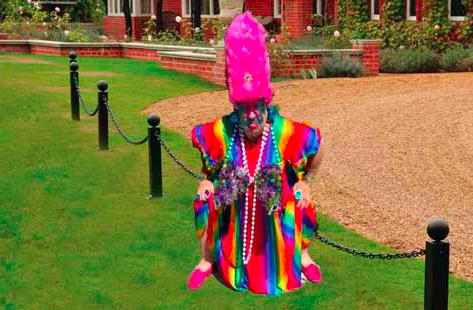
I recently had the opportunity to go on a vacation to Washington DC. After weeks of pestering and begging, my good friend David the Tour Guide agreed to show me around the sights of the city. Being an excellent tour guide, David graciously took me on a whirlwind tour of many museums, government buildings, and monuments. To help set the stage, keep in mind that it was mid-July. The weather was very hot and extremely humid. And yours truly, being a bodus rotundus queen of considerable thickness, does not do well with that deadly combination.
On the third day, David decided to send me to visit Arlington National Cemetery. Picture the scene. It was a searingly hot and sunny day. The unbearably high humidity was sufficient to steam a hot dog wiener. I took a taxi to Arlington National Cemetery. Bystanders ran for their lives as I emerged from the cab much like a blackhead being squeezed from a tortured skin pore, oozing onto the pavement and immediately engulfing everything in the vicinity, just like the blob from the 1950s sci-fi horror movie. I was grateful that all the bystanders had fled the scene because, in my efforts to squeeze out of the taxi, my wig had fallen off, my left breasticle had been bent into a very unnatural position, and my caftan had ridden up and become firmly wedged into the crack of my ass. I didn’t want any witnesses to observe my re-assembly routine.
After a momentary pause, where I was able to quickly reconstruct my somewhat questionable visage, I proceeded to the loading zone for the tram tour. As the tram pulled up to load, I was disappointed to see that it was an open-air trolley with no air-conditioning. Cue the vigorous waving of my clack fan, fast enough to move more air than the whirling blades of a Sikorsky Skycrane twin-blade heli-
copter in an effort to not dissolve into a puddle of melted hairspray and glitter.
The cemetery was indeed a beautiful and inspiring place.
The tram arrived at the tomb of the unknown soldier, and I was privileged to witness the very moving and inspirational changing of the guard ceremony. Just as they were laying a beautiful wreath of flowers on the tomb, a girl standing next to me passed out from the heat and landed at my feet. Sensing a disturbance in the force, I looked down to see that my feet were trapped by her. So, in an effort to help, I directed the wind from my fan toward this damsel in distress. Apparently, this was not an uncommon occurrence, because a couple of marines quickly swooped in and carried her away with great dispatch as if nothing was out of the ordinary.
The tram then took me to Robert E. Lee’s house on top of the highest hill. I was astounded that from the front porch of the house, I could see all of Washington laid out before me. The Lincoln Memorial, the Washington Monument, the Capitol Building, etc. So beautiful! So inspiring! So damned hot and sweaty! I sought some shade and a place to sit and recover. There were some benches provided in the trolley loading zone, but sadly, they were all occupied by what appeared to be a delegation of older Chinese women. There was an incredibly handsome park ranger herding people in the tram loading area. I thought to myself, self, how can I get the attention of the stud in uniform, but he was very busy and ignored my best “come hither” gaze. I noticed across the way a bollard and chain fence beneath the shade of a lovely oak tree. The bollards happened to have pleasantly rounded tops and my mind immediately thought how they resembled an army of butt plugs all lined up for service. I pondered, what the heck, I’ve sat on many more uncomfortable
things in my life, and they appeared to be the only opportunity to rest my weary feet. So, I went to the middle of the row, and carefully lowered my immense bulkitude down onto the butt plug so generously provided by the government.
As my colossal weight began to be applied to this “butt plug of destiny”, I discovered to my dismay that the posts were only decorative. It suddenly gave way, tipping over and taking me and several of the other connecting posts to the ground. My feet flew up into the air just as if I were preparing for a totally different kind of “adult amusement.” The pole disappeared from view and became wedged along with my caftan into my ass crack. Oh, the horror! Oh, the embarrassment!! Oh, the disgrace!!! I looked to the handsome ranger to come to my rescue but alas, who should be the only person to come to my aid but a tiny hunchbacked ninety-year-old Chinese grandmother who reached down to help me up. After getting back up, I decided to hide behind the tree trunk until the tram arrived, whereupon I discretely slunk to the very back of the train so as to be out of the view of the witnesses of my disgrace. This story leaves us with several important questions:
1. Should I install some fans in my breasticles to give me a blow job on hot days?
2. How difficult would it be to install a water-cooled air-conditioning unit in my beehive wig?
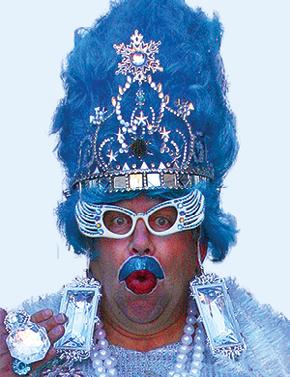
3. Are moments like when feet fly into the air, where the term Helium Heels comes from?
4. Could I create a folding stool to resemble a fashionable bustle on the back of my caftans, that I could sit on in emergencies?
5. Could I call them Butt Plug Bustle Boosters?
These and other eternal questions will be answered in future chapters of The Perils of Petunia Pap Smear

